Search Travel Market Report

- Packaged Travel
- Hotels & Resorts
- Destinations
- Retail Strategies
- Niche & Luxury
- Training & Resources
- Brian Israel
- Briana Bonfiglio
- Dan McCarthy
- Dori Saltzman
- Jennifer Arango
- Kelly Fontenelle
- Keri-Anne Slevin
- Louis Intreglia
- Sarah Milner
- Tom McCarthy


Looking to Sell Your Small Travel Agency? Here’s What to Do
Travel agency owners can increase the attractiveness of their agency by preparing their business before they put it on the market. Photo: Shutterstock.com.
If you own a travel agency that grosses more than $3 million in sales annually, and you’ve got solid market share, a diverse business mix and talented employees, buyers may come knocking on your door. But what if yours is a smaller agency? How can you attract potential buyers? Just as a homeowner takes pains to stage their house to boost its value before putting it on the market to sell, agency owners can increase the attractiveness of their agency by preparing their business before they put it on the market.
Related Articles
That was among the topics addressed at a workshop on exit strategies during the 2018 annual conference of Travel Leaders Network in Las Vegas earlier this month. The presenter, travel industry attorney Mark Pestronk, was joined by a panel of three industry members who collectively have acquired dozens of agencies in recent years. Preparing your agency for sale Here are eight steps that agency owners should take in the year before they put their agency up for sale. 1. Don’t sign new long-term contracts. Avoid signing new long-term GDS agreements or office leases, as they make an agency less attractive to buyers. This is Rule #1, Pestronk said. For instance, he explained, if you sign a new contract with Apollo, you could be limiting potential buyers to other Apollo agencies. Buyers also do not want to be saddled with a long-term real estate lease, particularly in an era when location drives less and less agency volume.
The exception, said panelist Jason Block, managing partner of Travel Equity Partners, is when an agency’s physical location is an important factor in attracting new business. “The key is having good data, being able to document that it is bringing in new business,” said Block, whose travel holding company is in Alpharetta, Georgia. 2. But do sign some types of contracts. There are exceptions to the no-new-contracts rule, Pestronk said. Employment contracts, even those that do not include a noncompete or non-solicitation clause, are worth signing because they make employees less likely to leave an agency after it is acquired. It is primarily a psychological effect, not a legal one, he said. It is also a good idea to have your corporate accounts sign a contract, even if the contract stipulates that the account can terminate in 30 days. Again, it’s the psychological effect. “Once they sign they are less likely to jump ship once you sell,” he explained. 3. Incentivize your agents to sell more. In Block’s view, the most important step leisure agencies can take in preparing to sell is to put all sales advisors on a production-based compensation plan. “The minute you do, you’ll find that 90-plus percent of them will start producing more. Your business will be more profitable, and it will be more compelling for a buyer.” Similarly, Pestronk said, owners should redouble their efforts to sell preferred suppliers in order to maximize overrides and increase the bottom line. 4. Make yourself dispensable. If you’re planning to stop working at your agency after the sale, it’s critical to train or hire someone to do your job, Pestronk said. “You need to have staff that is trained to replace you, to be a general manager of your location. Having that talent will make you a very attractive prospect.” Panelist Dave Lovick, co-owner of Market Square Travel, a Minnesota agency that has acquired 15 to 20 locations in the last two decades, said that for his firm, the top factor in making a purchase is people. “Bringing in good salespeople is a big deal. Our biggest struggle is finding good talent, so if an agency has that, it makes it quite valuable.” In the same vein, if you are an agency owner who is personally responsible for a large share of your firm’s sales volume, you should change that before trying to sell, advised panelist Tom Carlsen, CEO of Envision Travel Holdings in New York. “If an owner is doing a lot of the sales, you might want to look at farming some of that business out to your employees. It will make your agency a more attractive sale.” 5. Recast your profits. While your tax accountant probably advises you to charge as many personal expenses as possible to your agency to minimize its tax exposure, when preparing to sell you should add those deductions back into your bottom line so you can show a potential buyer your true profit picture, that is, your recast profits, Pestronk advised. Make a detailed list of all such expenses, including costs like country club dues, personal travel, charitable contributions, any excess rent you pay if you own your location, so you can show it to the buyer. “When in doubt, add it back. Be expansive in making that list. All that will be considered by the buyer as profit,” said Pestronk, emphasizing the importance of this step. 6. Eliminate non-essential personnel and expenses. If you’ve been keeping unproductive employees on your payroll, now is the time to let them go. “Having them on the payroll will make the business less attractive to a buyer,” Pestronk said. Block also advised sellers to “get rid of any operating expenses that aren’t directly attributable to new revenue production.” Think about the multiplier effect, he said. If you’re going to sell your agency for three or four times its annual profit, if you eliminate a $10,000 expense, that amounts to a $30,000 or $40,000 gain in sale price. 7. Have clear financial statements. Agency owners must keep clear financial statements that can be substantiated and that they understand, said Pestronk, who commented that this is often overlooked by sellers. It’s important that financial statements be supported, agreed Carlsen, who said he always looks through an agency’s back office systems for supporting documentation. “Make sure the sub-reports are all tied in and that the numbers you’re presenting to the buyer will withstand scrutiny,” he advised. 8. Know when to sell. When is the best time to sell? A year or two after you’ve implemented all of the above steps, because that’s when your agency will be at its most profitable. “Sell at the top,” Pestronk advised. NEXT TIME: How to find a buyer for your agency, what buyers are paying and more.

MOST VIEWED
- River Cruise Ship Evacuated, Danube Shut Down Amid Historic Flooding
- High Waters Force Danube River Cancellations, Ship Swaps
- Virgin Voyages Cracks Down on Predatory Travel Advisor Behavior
- U.S. State Department Issues ‘Worldwide Caution’ Travel Warning
- Travel Industry Acronyms Advisors Need to Know
- American Queen Moved to Recycling Facility
- 9 Instagram Accounts for Travel Advisors to Follow
- 9 Apps or Tools that Can Help Travel Advisors Work Better and Faster
- How One Advisor Uses Automated Systems to Grow Her Business (and Sleep at Night)
- Cruise Line Rebating Policies: A User's Guide and Chart
- American Airlines Pulls Back on AAdvantage Move
- American Cruise Lines Chooses To Scrap Former AQV Vessels

Subscribe today to receive daily in-depth coverage, analysis of industry news, trends and issues that affect how you do business. Subscribe now for free.
Subscribe to TMR
A bullish message of business booming was something TMR heard over and over during this year's EDGE conference.

The first Ask-an-Advisor of 2024 takes on fees with a brand new panel.
Every time a travel advisor reminds their audience of relaxing on the beach, romantic moments in Paris, and what it would be like to cruise the Caribbean with friends, they get another step closer to turning a follower into a client. But who has time to spend a day scrolling and posting?
Travel advisors are sending clients around the world for Taylor Swift's Eras Tour – and other concerts, too.
The biggest barriers for bringing new talent into the travel industry.
Flight Centre’s independent networks have been merged into the new Envoyage brand.

- Host Agencies
- Accelerator Course
- Travel Jobs
- Travel Agent Chatter
- Etiquette & Rules
- Privacy Policy
Travel Agent Leads: A Complete Guide [+Comparison Chart]
If you’re struggling to grow a thriving client base, a travel leads program may be a good tool for you. This article will take a closer look at travel industry association, host agency, consortia, and franchise lead generation programs, addressing:
- Travel Agent Leads: What Are They?
- Two Different Types of Travel Agent Leads
- How to Travel Agent Lead Programs Work?
- What to Expect from Travel Agent Lead Programs
- Evaluating Travel Agent Lead Programs: 5 Questions to Ask
- Travel Agent Leads Comparison Resource
- Alternatives to Travel Agent Lead Programs
All the programs on our comparison chart are listed on our site! So be sure to check them out!
What Is a Travel Agent Lead & What Do Lead Generation Programs Do?
A travel agent lead is potential traveler who has shown interest in travel planning services, but is not yet aligned with a travel agent.
A travel agent lead is potential traveler who has shown interest in travel planning services, but is not yet aligned with a travel agent. This could be traveler who has contacted a travel agent, filled out an inquiry form, or expressed interest in a specific type of trip. Travel agent lead generation programs these leads to travel agents.
More specifically, for the purposes of this article, when I’m referring to lead generation programs I’m talking about client leads that come from your host agency, franchise or consortium ( not direct to your travel agency through an inquiry form).
I’m not talking about lead generation apps and programs outside the travel industry. I’m also not talking about referrals from Jack who’s in the PTA with you, or Sally from your kickboxing class. I’m talking about the kind of travel leads that are not a direct result of your own connections, marketing or social media efforts.
Rather, the host, franchise or consortium will leverage their own marketing and branding to attract clients and somehow pass them along to you, the agent.
Two Different Kinds of Travel Agent Lead Programs
There are two primary kinds of travel lead generation programs. Before I jump in, I just want to mention that I'm making these terms up to help explain them. So you will not find them in textbooks or the Googleverse.
1. Mediated Travel Agent Lead Generation Programs:
By a "mediated" lead generation program, I mean that the host agency, franchise or consortium qualifies the travel agent leads and designates which agent they will be assigned to. That's right, they are the matchmaker.
So when kickbox Sally calls into Supernova host agency asking for a wellness trip to Tulum, Mexico, Supernova host agency will use their worker bees or some kind of algorithm (the matchmaker) to decide which travel agent will be the best fit for the lead.
The leads will (likely) be distributed based on factors like travel agent niche, expertise, destination, sales history, etc.
2. Unmediated Travel Lead Generation Programs:
This is the much more common style of lead generation program. With this method, the host agency, consortium or franchise is hands off. Typically it operates like a travel agent directory, offering a platform for travel agents to list their expertise, niche, experience, bio etc. This way, kickbox Sally will choose for herself what agent she wants to approach to book her trip to Tulum.
Instead of a matchmaker, it's more like an online dating profile where the clients go shopping around for the best match. With unmediated travel lead generation programs, you need to ensure you still have a strong profile that engages clients (more on this another day).
How Do Travel Agent Lead Programs Work?
Travel agent lead programs are intended to complement an agent's (or agency's) own lead generation efforts—not to replace them
With both methods, the travel agent benefits from the marketing/branding magnetism of their particular host, franchise or consortium. Some companies will also offer their own travel agent directories in addition to a consortium's directory. The more places an agent is listed, the more likely kickbox Sally will find you.
That said, when I reached out to places offering travel leads, many of them were clear to point out that lead programs are intended to complement an agent's (or agency's) own lead generation efforts—not to replace them . So if you're thinking that you're going to sustain your business on a lead generation program alone, you may be disappointed.
This brings me to . . .
What to Expect from Travel Agent Lead Generation Programs
Host agencies reported average close rates that ranged from 10-95% in 2019 (and many hosts did not have a number or exact number available). Ultimately, lead programs are only as successful as the agent who is receiving the travel lead. In order to turn leads into sales, your marketing and sales game has to be on point. If your travel agent profile or travel agent website is not A+, receiving a travel lead won’t do you much good.
It’s kind of like if you have a surprise guest come stay at your house. You want the sheets to be on the bed and the cupboard to be full of snacks if you want that guest to stay and keep coming back.
Evaluating Travel Agent Lead Generation Programs: 5 Questions to Ask
If you’re here, you probably know that you want to use a lead generation program, but you’re not sure where to start. Like finding a host agency , there’s no one travel lead program that will be perfect for everyone.
Here’s a few questions to ask companies to see if their lead program is right for you:
1. How many travel leads do agents receive on average?
Ask how many monthly or annual leads you can expect. Leads are also a balance of quality and quantity. If you get a fewer quality leads (known as warm leads), that might have a greater impact on your bottom line than getting a ton of leads that are more difficult to close. (See below about the close ratio.)
2. How is it determined which agent receives the leads?
Who will get the leads? Ask your host, consortium, or franchise how they determine which agency receives which lead. If it's dependent on niche, for example, you can ask more specifically how many leads they pass on looking for your niche. If it depends on prior sales, you might want to ask how a new agent can get an added edge for receiving leads (if you're a newbie).
3. What is the commission split for bookings generated from the leads program?
Most travel lead programs do not cost anything up front. Instead, the company may generate some income by taking a higher portion of the commission split. If the commission split from a leads program is lower than your standard commission with the host/franchise/consortium, you may also want to ask if this modified commission split continues with future bookings for the same client.
4. Who do the travel leads belong to?
This is an important question to ask in case you ever leave the host agency/franchise/consortium to join another or get your own accreditation. If the lead belongs to the host/franchise/consortium, that means that the client cannot stay with you if you change host agencies . This is similar to a travel agent employee who quits working at a storefront agency, where clients typically go back to the agency rather than follow the departing agent. So even if you develop a relationship with that client and work with them for a long time, you may not be able to keep their business.
5. What is the average close ratio of the leads among agents?
Remember that the travel company is not responsible for closing the sale. That's on you! But a closing ratio can give you an idea of how quality the leads are. If the closing ratio is lower, it might be okay if you receive more monthly leads.
You’re probably thinking, gosh wouldn’t it be nice if there were a handy resource that outlined all that information? Well guess what?! You’ve struck gold . . .
Travel Lead Programs: Let's Compare
I reached out to our travel industry connections and asked them those very questions and we created a nifty table with the info.
Also, just because a company isn’t listed on this table, it does not mean that they don’t have a leads program. It just means they chose not to participate.
Here's a list of our listed travel companies who weighed in on their leads program. Click on their card to see the full info on their program. (I also recommend clicking on "view larger version" on bottom right corner. That will make it easier for you to sort by what you're looking for in a leads program.)
Alternative Travel Agent Lead Generation Opportunities
Beyond hosts, franchises and consortia, some other organizations and suppliers may also offer agent directories that are consumer facing.
The IGLTA (International Gay and Lesbian Travel Association), and ATTA (Adventure Travel and Trade Association) also have a consumer-facing travel agent directories or bios.
These are just a few examples off the top of my head. If you know of others, please let me know! If you're interested in membership to some of these travel organizations, ask if they offer this type of service. You can ask them the same questions above that you'd ask a host, franchise or consortium regarding close rates and fees. Milk those memberships!
Moral of the story: You can lead a traveler to a travel advisor, but you can't make them book it. But I'm curious to hear from travel agents and your experiences of using (or having used) travel leads. What challenges and joys did you encounter? What questions do you ask?
Let us know—I'm really looking forward to hearing from you.
Editor's Note: This post was originally published November, 2020. We update and republish the post to reflect changes in travel agent leads program information. The most recent publish date indicates our latest update.
About the Author

Mary Stein has been working as a writer and editor for Host Agency Reviews since 2016. She loves supporting travel advisors on their entrepreneurial journey and is inspired by their passion, tenacity, and creativity. Mary is also a mom, dog lover, fiction writer, hiker, and a Great British Bake Off superfan.

- Agent Tools
- Starting Up
CleanPix Blog
The latest updates from cleanpix, creating buyer personas for the travel industry.
Thu Oct 18, 2018 in General
Buyer personas help with that. In this post we’ll examine what they are and why they’re so important. Then we’ll layout a process you can follow to create your own. Finally, we’ll leave you with a couple buyer persona examples and a few ways to use them to market your business.
Let’s get started!
The “What” and “Why” of Buyer Personas
“Know your customers” is a common phrase in marketing circles. But how? Buyer personas.
Buyer personas are fictional characters made to mirror a company’s target audience. They aren’t real, but they represent real people.
When you’ve successfully created one (or two, or three, or five!) for your business, it will help you humanize your organization’s marketing efforts and allow you to better reach your target audience .
For example, rather than creating content for “26 year olds,” you can create it for “Tim, the 26 year old entrepreneur.”
Can you see the difference? Even just this tiny bit of added detail gives you so much more clarity. And this added clarity will help you cut through the noise in an ultra competitive field like travel.
It’s much easier to relate and appeal to customers when you think of them as a single person, rather than a crowd of people.
Create the Perfect Buyer Personas for Your Company
Ready to create a buyer persona for your travel business ? The fun starts with deep research. It will definitely take a fair bit of time and elbow grease to do, but it’s not too bad when you know where to start. And the end result will be more than worth it!
The Information You Need
Let’s start with the kind of details you’ll be looking for:
Demographics
These are the “cold hard facts” about your audience. The statistical information that separates them from the rest of the population. You want to know their:
- Physical Location
- Relationship Status
- Family Size
- Spoken Language
- Household Income
- Level of Education
- Content Preference Type
- Social Media Habits
Psychographics
Now we want to dig deeper. Who is the person behind the facts we just mentioned? Humans are a lot more than statistics. Find juicy information on your ideal customers like their:
- Goals and Motivations
- Fears and Challenges
- Reasons for Traveling
- Obstacles to Travel
- Purpose for Travel (Business or Leisure)
- Favorite Travel Activities
- Expectations While Traveling
When you put all this information together, both demographic and psychographic details, you really start to see who your target audience is.
You’ll know the age bracket and location of your customers, what they can afford, and why they want to travel in the first place. You’ll understand the way they like to spend their trips and various obstacles keeping them from booking their next vacation.
These details are incredibly valuable!
Just remember, you can (and probably should) create more than one buyer persona. For most businesses, we recommend three to five. This will allow you to segment your audience appropriately without going overboard.
For example, a local hotel might cater to business travelers, family vacationers, and jet-setting retirees. Each of these groups needs their own persona.
The Research Phase
Now that you know what information you need to dig up on your ideal customers, it’s time to get to it. Here are the top places to look for audience information :
Current Customers
Shhh, we’re going to tell you a little secret: one of the absolute best sources of audience information is your current customers. Obvious? Yes. Overlooked? Definitely!
If and when you’re able to, talk with your customers. “Interview” them and find out more about their lives and motivations. What made them book a trip with your company? What frustrates them, in general, during the booking process?
Also, consult your email list and social media profiles. Ask you followers these same questions. A wealth of persona information is right in front of you, you just need to ask for it.
Marketing Analytics
Let’s bring technology into the fold. What do your marketing analytics tell you about your best customers?
Start with your company’s website. Where are visitors coming from, what keywords are they using to find your business, and which webpages are they frequenting most? This will shed light on their mindset and the desires they have when booking travel.
Look at your email marketing software as well. Which messages get the most opens, clicks, and conversions? These details can tell you what kind of content your customers prefer, the kind of travel they enjoy and much more.
Finally, dig deep into social media analytics. Networks like Facebook, Twitter, and Instagram collect an incredible amount of user data. Use this to your advantage.
And don’t forget to employ social listening tactics and discover what travelers are saying about your industry, too. Do they have questions? Have they experienced problems? You won’t know until you log on and listen.
Review Sites
Review sites like TripAdvisor and Trivago are another channel for audience research. What have past customers said about your travel business? What have they said about your competitors?
Digging deeper, who are these people leaving reviews? Are they business travelers or vacationers? See if you can find out.
Industry Information
When creating buyer personas, it’s helpful to have your finger on the pulse of your industry. What do the latest studies tell you about traveler habits and preferences? What trends have experts identified? How will this information impact your business?
These details can be found in travel related publications, websites, and TV channels. So read up and watch videos. Learn everything you can about the general state of your industry.
Google Searches
Finally, before concluding your research efforts, perform a few Google searches. You may stumble across some information previously unknown to you. Think like your ideal customer and search for terms and phrases that pertain to them. What comes up?
Assemble Your Personas
Happy with the amount of research you’ve collected? Great! Now it’s time to take all those details and assemble them into a usable buyer persona.
First, give your persona a name. It can be whatever you want — Robert the Retiree, Bill the Business Traveler, Lisa the Family Vacation Planner. Just first names like Jennifer, Christina and Jeremy are acceptable as well.
Next, find a picture for this person. It can be any random Google image that, to you at least, represents this segment of your audience. Putting a face to the name will help you further visualize your audience as actual people.
Then begin to assemble your research findings into the demographic and psychographic categories we mentioned above.
Perhaps you find that (at least for this persona) your audience tends to be between the ages of 18 and 25, lives in the U.S. and speaks English, makes less than $45,000 a year, is a leisure traveler who seeks adventure, and loves Pinterest.
A persona for this person might look something like this:
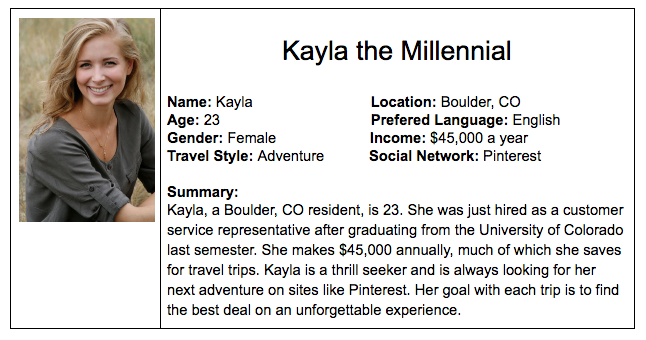
Also, we like to assemble the information in a tidy, visually appealing way. We find that it just makes them easier to use. But this isn’t mandatory. A spreadsheet or Google doc with all the same info can work just as well.
Finally, while your research will turn up loads of valuable information, there may be some areas where you’ll need to make educated guesses about your audience. That’s ok! If you find that these guesses were inaccurate, you can always adjust your buyer personas.
A Few Buyer Persona Examples
We’ve covered the elements that create an effective buyer persona. We even shared a streamlined version of one (Kayla the Millennial) in the last section. Let’s examine a couple more examples so that you get a solid idea of what we’re after here.
Here’s a strong entry from Lidia Chia :
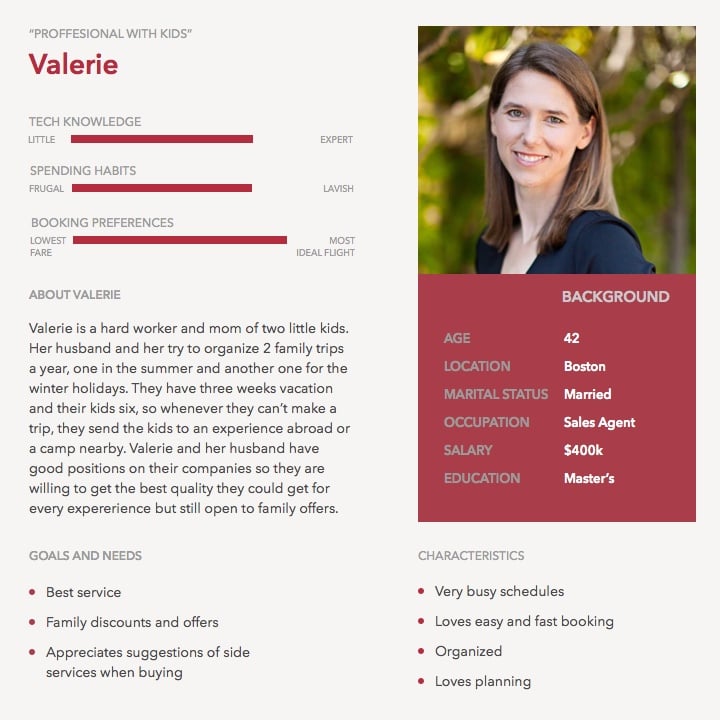
The company marketing to “her” will have much more success than if they were to simply promote their services to “professionals with kids.”
Here’s another solid sample from HostGator :
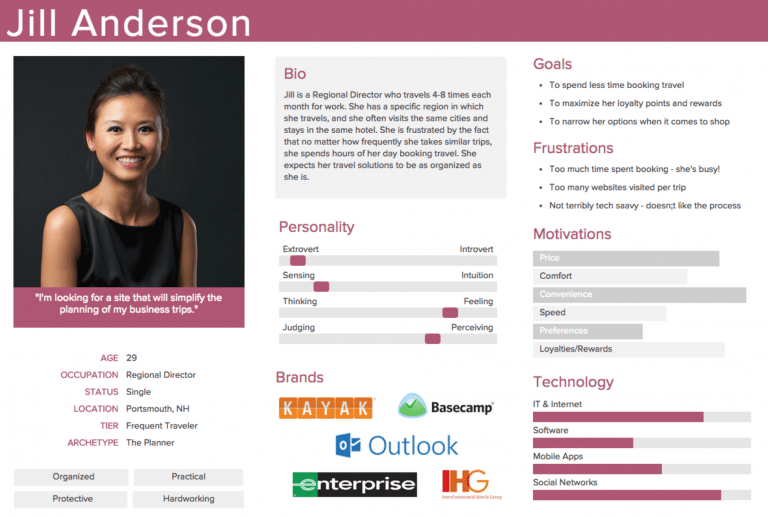
Again, plenty of quality details here that really give us a clear picture of who to market to. Jill is a business traveler. We know details about her personality, brands and technology she likes, and her home location.
Possibly even more important, we also know her goals, frustrations, and motivations when booking trips. This travel buyer persona is very well done!
How to Use Buyer Personas in the Travel Industry
Hopefully you can see the value in buyer personas and already have a few ideas of how you can use them to better market your travel brand . But to help you get the creative juices flowing, here are a few ideas:
Target Your Content
When you segment your audience into distinct groups, each defined by a separate persona, you can then better target the content your create. A blog post about activities for thrill seekers may appeal to Kayla the Millennial, but not to Robert the Retiree.
Instead of promoting the same article to both groups, you can target just the “Kayla” persona. This will ensure that you’re only sending relevant content to your audience.
The same principle applies to other marketing channels as well such as videos, email campaigns and social ads.
Be Where Your Audience Is
If you know where your ideal customers like to hang out online, you can join them. Do they prefer Facebook or Instagram? Do they enjoy reading blog posts or watching videos? Which industry groups and forums are they a part of?
Not only will you be able to learn even more about your target audience, but you’ll also be able to engage them in conversation, build relationships, and promote your business.
Just remember to treat these interactions like conversations, not sales pitches. Your audience doesn’t want to be sold to. They want to engage with others who share their passion for travel.
If a marketing opportunity presents itself, by all means take it! But don’t force the issue.
Partner With Popular Brands
When we say “popular brands”, we’re talking about other companies your audience members care about. Understanding your buyer personas allows you to partner with the right organizations and create marketing campaigns that benefit both of you.
Plus, people tend to judge companies the same way they judge humans: by the company they keep. If your business associates itself with other organizations your target customers love, it will elevate your standing in their eyes.
Speak As They Do
Lastly, a thorough knowledge of the people you hope to reach will enable you to speak their language. How do they verbalize their goals, frustrations, and motivations? Are their common phrases they like to use?
By speaking as your audience does, your marketing materials will be more meaningful to them. You be able to connect on a deeper level. And you’ll have a much better chance of converting a large number of them into paying customers.
Over To You
Buyer personas are an incredibly important aspect of marketing a travel business. Without them, it’s difficult to reach the right people, create relevant content, and differentiate your business from competitors.
So start building your personas today! Begin with research. Dive deep into both the demographics and psychographics of the audience you hope to reach. Then assemble each buyer persona with its own name and picture.
After they’ve been created, you personas will make the marketing process much easier. You’ll be able to better target your content, be involved in the digital communities they care about, and speak in a way that will resonate with them. Good luck!
Contact & Support
Interested in pricing or just want to talk to a human? We would love to hear from you!
Support: [email protected] Sales: [email protected]
Support: 1-866-266-1861 Office: 1-403-266-1861
Mailing address
2225 15 ST SE Calgary, Alberta T2G 3M3 Canada

Start your 30 day trial
The Ultimate Buyer Personas in the Travel Industry: Millennials and Gen-Z

They are poised to change the world, but what do we know about Millennials and Gen-Z and their spending and travel habits? And even more, why should tour operators crave them as customers?
If you’re working as a decision-maker in a tour operator or a destination managment company, one of your main goals is to increase sales while retaining your customers by meeting their expectations and providng them with a great experience. One of the ways to achieve that is to fully know your buyer persona.
1/3 of the population with $200 billion spending power
Today, the leading buyer persona in the world are Millennials, born between 1981. and 1996., people who have come of age during a time of technological change, globalization, and economic disruption. That’s given them a different set of behaviors and experiences than their parents – they created an entirely new view on life, technology, economy, and travel. Today, they make up 32% of the population with more than $200 billion in spending power .
At the moment, Millennials travel more than any other generation – in the US, they travel 35 days per year, while Gen Z travels 29 days per year. Still, Gen Z travels more than Generation X and Baby Boomers and is right behind the Millennials.
“Considering that most of the people in the Gen Z cohort are still financially dependent on their parents, this trend is quite logical”, states Hotelmize blog.

It’s all about authenticity (and technology)
Before anything else, Millennials and Gen-Z value travelling in their lives so much more than the previous generations, and around 90% of them, according to many surveys, travel with the goal to experience new cultures. They don’t want tourist traps, they want unique, authentic experience, and they want it now.
When you look at it, Millennials and Gen-Zs are a simple generation. They are technologically advanced, more than any other generation before them, and they simply expect all segments of their lives to be eased and improved by technology, travel included.
As stated in the report by booking.com, “more than half (55%) of travelers are excited about tech’s potential to further personalize their travel experiences in the near future”. They also coined a new term for this trend – “ spontechnaity” . It means that tech will drive travel in the future and enable a more spontaneous, seamless customer experience.
In order to successfully respond to travelers’ needs, tour operators cannot ignore the power of technology anymore.
Decision-making factors
The Millennial and Gen-Z travelers, the endless explorers thirsty for knowledge, prefer to travel to learn something new. They’re prone to taking last-minute trips, too, to satisfy sudden wanderlust.
Travel companies should capture the millennial market by adjusting their services:
- be more present online
- have online booking
- mobile optimised websites
- switch marketing approach from traditional to digital and social media.
We elaborated in greater detailed advice on responding to the new trendes in this blog – check it out!
Related posts

Travel Agents, Adopt New Technology!
Struggling with adopting new technology, but swamped with bookings? This is a must-read for travel agents in 2024!

Top Travel Trends In 2024
What will be “the thing” when it comes to traveling in 2024? We singled out top 3 travel trends. Read on to dive deeper into them!

How Do Modern Travelers Book Trips?
To know your customer is to know their habits and needs. How do modern travelers book trips? How do they choose a tour operator?
By continuing to browse or by clicking “Accept”, you agree to our site’s privacy policy.
Accept Privacy policy
The Roadmap to Selling a Travel Agency
Author: Phil Hagey

It’s never too early to explore options for selling your travel agency.

2015 has been a fantastic year for mergers and acquisitions. Low interest rates, ease of access to capital and a growing exodus from Corporate America has given way to a new class of entrepreneurs looking for healthy businesses to invest in. Many first-time entrepreneurs seek a business that aligns with their hobbies, making the travel industry a hotbed for buyers seeking to acquire an established company.
The travel industry employees over 7.6 million people in America and can bring in profit margins around 4.1%. While many people thought travel agencies would slowly go the way of the library or record store, they are starting to make a comeback and regain value. Baby Boomers entering retirement are starting to travel more and instead of using websites like Expedia or Travelocity, they are reverting back to travel agencies. In the past four years, flights booked through travel agencies has increased by 11% and close to 77% of all cruises are booked through travel agencies. As nearly 10,000 Baby Boomers turn 65 every day and transition into retirement, travel agencies can expect an uptick in business and revenue, making it a good time to begin thinking about the next step.
If you have been thinking about selling your travel agency, it’s never too early to begin exploring options. The best time to sell a business is when it is trending upwards and with group and business travel expected to increase over 2016 and 2017, it might be the right time for you to begin planning. The first step to selling a travel agency is finding out how much it is worth. To get an idea of how your business stacks up, these formulas will show you what factors are taken into account when valuing a travel agency. Remember that only a professional intermediary can tell you the true value of your travel agency and that these formulas are merely a guide.
- 45% of annual gross profit
- 1-3x SDE + inventory
- 2-3x EBIT for small agencies, 3-5x EBITDA for large agencies
Hopefully now you have an idea of where your business currently stands so that you can begin making changes to get it to where it needs to be. We have sold over 500 businesses in the past 20 years and have helped hundreds of entrepreneurs increase the value of their business prior to selling. We hope these tips can help you prepare your travel agency for the next step and ultimately, help you obtain the highest sales price possible.
No matter what industry you are in, if you do not have a web presence for your business, you are negatively impacting your sales and growth potential. Independent travel agencies have to compete with mega-sites like Travel Zoo and Hotwire, and not having a web presence severely sets your business back. If you do not have a website, the first step is creating one. If you can add booking capabilities or an active blog that advertises deals, even better. While more people are seeking out travel agencies to book their trips, having a website with robust planning capabilities will also capture people who seek travel accommodations solely through the internet. Compliment your website with social media and a pay-per-click campaign and watch your numbers steadily increase. Buyers will also be more inclined to choose an agency with an established internet presence over one that has not invested anything into digital marketing.
Manage Cash Flow
Travel agencies often experience high levels of seasonality as any people are booking cruises and exotic vacations during the warmer months. This can lead to an uneven cash flow that impacts your EBITDA and concerns potential buyers. To create a more balanced cash flow, market special trips, tours and rates during winter months. While more people like to travel during the summer, there are tons of options during winter and advertising discounted rates might reel someone in who wasn’t planning a trip but couldn’t pass up a deal. A few ideas for winter travel could include discounted airfare around the holidays, Caribbean or Alaskan cruises, Northern Lights packages or deals to Australia or South America where it is still warm. Many travel agencies ramp up their marketing and discounts around Cyber Monday, where millions of people take advantage of lowered rates to book future travel. Cash flow is huge when selling a business and is probably one of the most important factors in determining worth; you’ll want to do everything you can to boost these numbers starting about 3 years prior to when you plan on selling.
Employee Retention
Retaining employees in the travel industry is important; oftentimes, customers feel like they have a relationship with “their travel agent”, not the firm they work for. When agents quit or switch firms, they often take their clients with them, which can be a blow to your cash flow and sales. The best way to retain your agents and thus retain their clients, is to take care of them. The first step in retaining employees to hire the right ones and develop relationships with them. Creating an open line of communication and a good culture in your travel agency will go a long way when it comes to keeping your agents. Unfortunately, many travel agents are under paid, prompting them to continuously seek new employment to get a better salary. Paying your agents a fair rate (whether base pay or commission) plus offering travel perks if feasible are two main ways to retain your top producers. As agents begin to build tenure with your firm, you’ll see your numbers go up as they take on more clients, increasing your cash flow and showing stability with buyers.
Vendor Contracts
The appeal of using a travel agency is having access to discounted rates and special packages that would not be visible to you if you were booking directly through a hotel, cruise line, etc., while having someone organize your trip for you. To be able to provide special rates and packages, your firm will need to establish contracts with major travel providers. Having a variety of contracts allows you to offer several different types of travel accommodations, thus casting a wider net over your target audience. Having an array of contracts also gives you more marketing fodder, which can expand your reach online and bring in clients who may not have found your firm previously due to specific search terms on services you did not offer. Established contracts will attract buyers and travel agents due to the multitude of offerings at your firm and ultimately, more opportunities for sales.
If you have been thinking about planning the next chapter for your travel agency, we hope these tips have helped you get an idea of how to prepare. We recommend that business owners get annual valuations so that they can see how their business is doing, and can determine where it needs to go. Business valuations can reveal much more than a sales price about your business; oftentimes, they show owners where the holes in their business are and how they can improve issues prior to the sale. Ultimately, this knowledge will help you in the long run and make it easier to build, grow and sell your business. If you are ready to take that first step in planning your exit, we offer no-cost, no-obligation valuation services to business owners in the Southeast. Every entrepreneur understands the value in planning for the unknown and planning your exit is no different.
Contact Us!
Interested in Buying a business, Selling a business, or getting a business valuation? Fill out the form below and we'll reach out to discuss your needs. Our business valuations are strictly CONFIDENTIAL.
Feel free to reach out with any concerns!
Phone: 866.593.1587 Fax: 800.606.4597
3 Core Aspects of Successful Buyer Personas for Travel & Tourism Brands

How to Create a “Buyer Persona” in Tourism (FREE TEMPLATE)
- Milan Stojković
- August 15, 2019
A “Buyer Persona” is defined as the semi fictive representation of your ideal customer, based on market research and data about your actual customers.

If you are working in travel marketing, then you certainly already know that audience targeting is one of the strongest weapons you have in your marketing arsenal. However, in order to be able to perform appropriate targeting, you need to know who your “target” is.
We often emphasize that today, personalization is the key to success in tourism. Not only that you need to personalize your service but also your promotions and sale messages. The first step on this path is to create a so-called buyer persona.
Have you asked yourself who are your ideal guests and what problems can you solve for them?
If you do not have a clear picture of who your potential guests or tourists are, there are great chances that you will invest a lot of effort and resources in marketing and that in the end, you will not achieve the desired results.
In other words, all your marketing efforts and tactics have to be directed to the right people to those who are your potential tourists.
If you do not know how to recognize them and do not understand their habits, needs, desires, opportunities, and problems, your marketing performance will not yield any results; no matter how hard you try, simply because it is aimed at the wrong audience.
Lions can’t hunt zebras if they don’t know how they move, what are their needs and weaknesses.

The same applies to your marketing ads if you don’t know where and how to attack your ideal travelers.
Therefore, knowledge and understanding of your potential guests is a prerequisite for achieving desirable marketing results.
Why is this important?
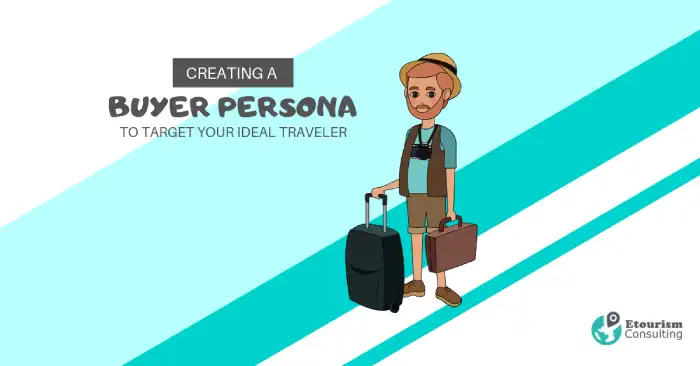
The Internet has brought incredible possibilities in targeting, or displaying ads exactly to those people who are interested in what we offer.
Previously, there were no such options. You could have put a beer advertisement at the time of the football game, but you’re not sure whether only beer lovers will see it and how many among them do not drink beer.
Now, however, you can easily show your ad ONLY to those people who are interested in what you offer and pay just for that. Therefore, the Internet is the most effective marketing channel, but only if you promote the offer to people who are your target group.
To know how to take advantage of this, you must first do the homework and get to know your target group.
If you don’t do that you will go to your Facebook Ads or Google Ads platform and you won’t know how to set up your targeting, or you will do it wrong. It is therefore importan t that you read this article .
What is A “ Buyer Persona “ ?

We know that we cannot be devoted to each individual (potential) tourist and guest, so long as their number is higher. Similarly, we cannot offer the same product or service to all our customers, primarily because their interests are different – the diversity of demand, as one of the main features of the tourism market, also conditions the relative diversity of the offer.
We know that in tourism, the offer is not easily adapted to a tourist demand. If a tourist is looking for a pool, you cannot make it overnight; if a guest demands a larger bathroom, you cannot just expand it. It is, therefore, important that you focus your bid on the market segment that you think will be most interested in what you offer.
What we can do is group a large number of our individual clients around some common interests, needs, problems, and so on. Just here, the “Buyer Persona” enters the scene.
After analyzing who our potential tourists are, we can segment them according to their needs, desires, interests, based on gender and age, family status, purchasing power, and so on.
Based on this analysis and market segmentation, different groups of our potential clients can be individualized in the form of one, two or three “Buyer Personas”.

As we have already said, “Buyer Persona” is a half-fictional figure of our ideal client. Why is it half-fictional? Because this person does not actually exist, we have invented and created it on the basis of numerous information and data about our real clients.
“Buyer Persona” , or our ideal client, represents a kind of generalization of all the characteristics of a particular target group. It is an ideal representative of one of our target groups (you should not have more than 5 target groups on the market).
Instead of focusing on some abstract concepts such as your target market or target group, “Buyer Persona” allows you to “humanize” and individuate your promotional messages.
Simply, you will easily understand your clients if you can “point your finger” to them and name them by one name, instead of talking about them using pronouns.
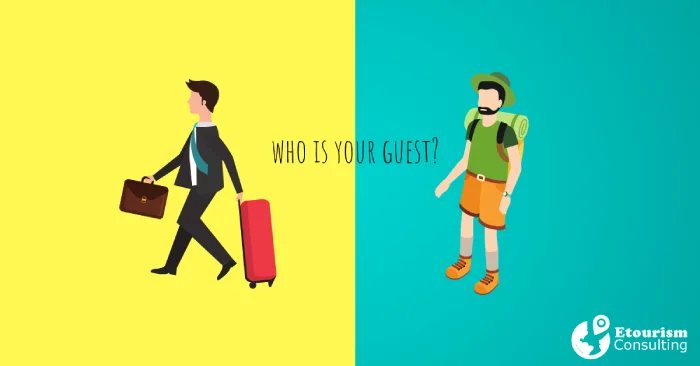
Based on all of the above mentioned, it’s clear that “Buyer Persona” will help you send a clearer and customized message to your target group, keeping your advertising costs low, which will ultimately result in more effective marketing.
How to create a Buyer Persona?
First of all, consider how your “ideal guest looks:
- How many years she has?
- What is her job and how much she can pay for a trip?
- Does she travel alone or with her family?
- Does she needs parking or transfer from the airport
- What is she generally interested in?
- Can she have an active vacation in your destination?
- Does she speak your language?
These are all the details that you, more or less, already know about the existing and potential tourists and guests. The closer and more precise you do that, the better the “Buyer Persona” will be.
To create your “Buyer Persona” you need to understand that group of your potential tourists and guests and see what their common characteristics are, if they have some common problems, fears hopes, and finally, their basic needs and wishes which you can fulfill with your offer.
There are several ways to do this…
GOOGLE ANALYTICS
By reviewing reports in the “Audience” section of your Google Analytics, you can learn a lot about your audience.
Demographic reports show the age and gender of your website’s visitors, and also the info about location and language, which devices are used (desktop, laptop or mobile).
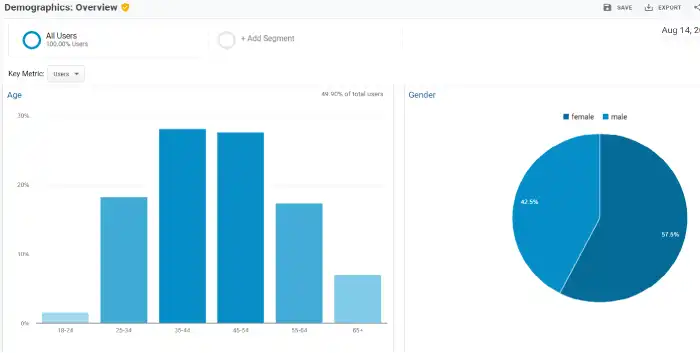
Probably the most useful segmentation of your audience is based on their interests.
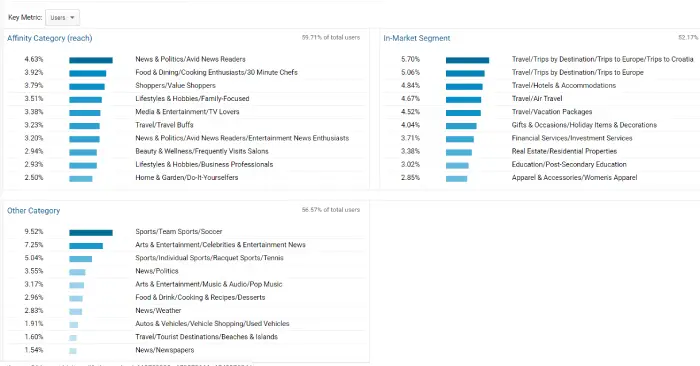
For each of these segments, check what their behavior on the website is – how long they stay, how many pages they turn during one visit, and what is the bounce rate. Those who have the greatest retention time, a higher number of pages visited per session and a smaller bounce rate are definitely candidates for sorting them into different buckets and defining them as buyer personas.
FACEBOOK ANALYTICS
Facebook page of your travel agency, destination, restaurant or a hotel also collects a wealth of information about your followers. This information is very useful because it helps you to better understand the fans of your page.

You can get even more info in the Facebook ads analytics. Just go to your ads manager, use the Breakdown option and choose between ages, gender, location, devices, etc.
You can definitely learn a lot about demographics of the people who engaged with your Facebook page or some of your ads.
What’s also important to emphasize is that the data contained in Google Analytics and on the Facebook page do not apply to the same audience! Audience information in Google Analytics relate to the visitors to your website, while the data in your Facebook page statistics relate to your Facebook page’s followers and fans.
FACEBOOK GROUPS
Facebook groups most often gather people of the same interest, with the same occupation, problem or any topic discussed by its members. All you have to do is search for the groups that deal with travel, hotel, tourism, specific destination, etc.
There you can see which questions are the ones that the members of the group are often troubled with, which topics bring the most interests, what they are afraid of and what their previous experiences were (either positive or negative).
Additionally, you can look at their personal profiles to get an approximate picture of who these people are, gathered around the common interest (e.g. Italy travelers, mountain lovers, nightlife enthusiasts), which is the essence of creating a “Buyer persona”.
ONLINE FORUMS
Similarly to Facebook groups, you can follow discussions on forums about important issues and questions related and important to your business.
Questions like “How to get a visa for Mexico?” or “What is the maximum size and weight of luggage?” and the responses can help you understand the fears and concerns of your potential tourists.
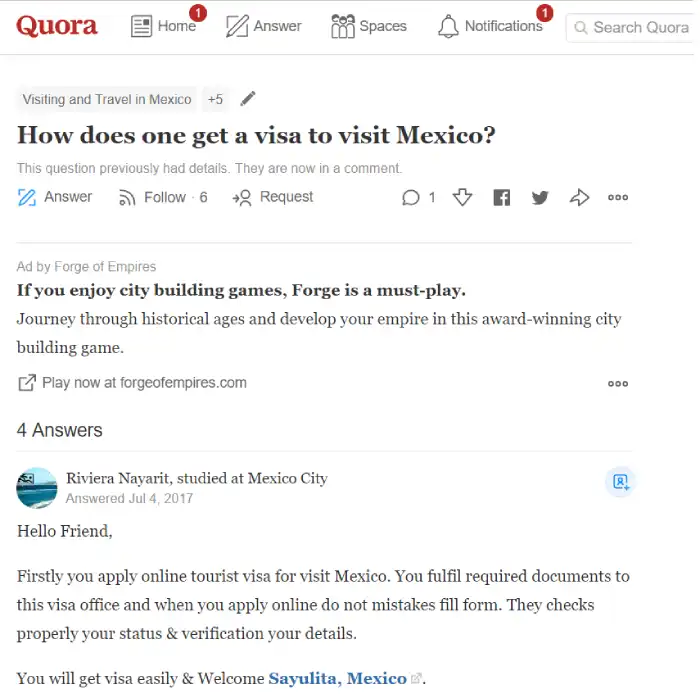
These are the real experiences and critics at the expense of your business and the quality of service provided by your tour company, restaurant, destination or hotel.
Browse the book of impressions; see the reviews that your hotel’s guests have left on the websites such as Booking.com or Tripadvisor, see the reviews that fans leave on your Facebook page – you will see what your tourists and guests liked and disliked. Knowing your existing customers will definitely help you profiling your “Buyer Persona” .
TALK TO YOUR POTENTIAL TOURISTS
Every time a potential tourist enters your agency, sends an email or leaves a message on your hotel’s page, try to find out more about him and his needs. Do you have a specific destination in the offer, whether your hotel is “pet-friendly”, whether vegetarian food is on the menu of your restaurant, whether it is a family holiday resort, does your hotel have a wheelchair ramp?
Starting from some of the most common questions and needs, to specific requests – you can learn a lot about your potential guests and tourists just by talking and communicating with them.
Additional tips
Think carefully about the details, because sometimes certain small things can be groundbreaking in high-quality targeting. Here are some examples…
You must know the true fears of your tourists. For example, parents with young children always fear for their safety, so in the ad you create, you can write that a doctor will accompany the group during the trip.
What do the tourists really want?
Do you know what your visitors really hope for and what exactly, perhaps secretly, they want from your hotel? If you recognize that, you are lucky! You can read more about this in this article .
Favorite websites
Where do your guests spend most of their online time? What are the websites and applications? Here you should not generalize and say something like “sports websites” or “babysitting and parenting websites”, but state the specific domain names of those websites. You can use this later in many ways, but the most obvious is to target these websites as placements with your ads using the Google Ads Display campaign .
Favorite brands
Sometimes, only one brand is enough to laser target the specific group and execute the most effective campaigns. For example, mountaineers probably liked McKinley’s brand, photographers liked Nikon, Sony, Cannon, or Carl Zeiss. You can easily reach the cyclists by targeting those who have demonstrated an interest in Shimano brand, with additional constraints on other interests (biking, mountain biking, etc.).
Here’s how we did it for the Sokobanja Tourist Organization:
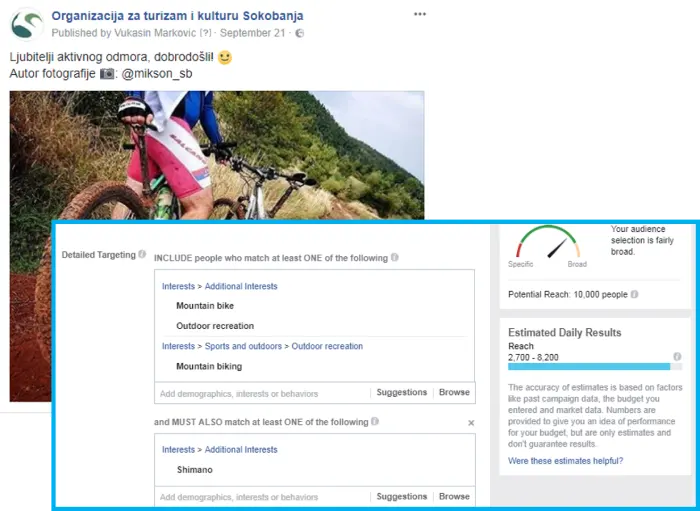
Free template for creating the Buyer Persona
If you have come to the end of this article it means that you have recognized the importance of creating a “Buyer Persona”.
That’s why we have prepared this template for you to help you create your “Buyer Persona” more easily for travel agencies, tour companies, travel destinations, hotels, apartments, restaurants, and other industry stakeholders.

Do the necessary research of the market, potential tourists and guests, and use this template to create your “Buyer Persona”!
Let’s mention once again that it is possible to create more than one “Buyer Persona”. Depending on how complex and heterogeneous your potential clients and guests are, you can create two, three or more “Buyers Personas” (we do not recommend more than five).
For example, for the marketing strategy of a hotel or apartment, two “Buyers Personas” could be created – one for the domestic, the other for the foreign guests, one for business, the other for leisure tourists or one for young couples, and the other for families with children.
Destination management organizations could also profile two “Buyer personas” the same way.
Travel agencies should make the segmentation for each package individually but also generally at the agency level.
Finally, we also note that just creating your “Buyer personas” does not guarantee great results.
Yes, in most cases it will help you achieve better marketing results, but it is necessary to say that there is no guarantee for it. However, much depends on the way you have explored and collected information about your potential tourists and guests, how you will execute the campaigns and on many other things.
One thing is certain – this method will allow you to customize your promotional messages to different market segments:
- You will show an ad to your business guests in which you will say that you have conference rooms, laundry services, photocopier and, excellent WiFi.
- You will show an ad to families with children in which you will emphasize that you have a playroom for children, a children’s menu in a restaurant, and an animator that will give parents the opportunity to have a few hours for themselves (because that’s what they secretly want).
Two completely different advertisements and one hotel. That’s personalization!
Get started from creating a “Buyer persona”, and if you need help, feel free to contact us .
Get This Free Template
Do You Want To Boost Your TRAVEL Business?
Drop us a line and keep in touch.
Understanding the Target Market for a Travel Agency
Are you looking to start a travel agency? Or do you already have one and are looking to expand into new markets? If you answered yes to either question and you’re trying to figure out who your ideal target market is, then this article is for you!
When it comes to the travel industry, there are a lot of different target markets that travel agencies can focus on. Depending on the type of services that you offer, your target market could be singles, families, couples, business travelers, or luxury travelers.
The target market for a travel agency will also change based on the type of travel and travel experiences being offered. For instance, you will attract a different type of customer if are offering adventure travel as opposed to romantic getaways.
Similarly, your target market can change based on the travel destinations that you offer.
In this article, we will analyze the market from different angles and discuss some of the needs of the different segments that constitute the target market for a travel agency.

Target Market for a Travel Agency: Different Types of Travelers
One way to understand the target market for a travel agency is to classify the various types of travelers into different segments.
Here are the most common types of travelers:
Single travelers/backpackers
Families with small children, families with teenagers, business travelers, luxury travelers.
Each type of traveler has different needs and wants when it comes to planning a trip. Let’s briefly look at each the of needs of each type.
The needs of single travelers or backpackers are quite different from those of other types of travelers. They are usually looking for budget-friendly options and are not as concerned with luxury or comfort. They often want to explore new places and experience new things, so they may be more interested in adventure travel.
Couples often want a romantic getaway where they can relax and spend time together. They may be interested in luxury travel options, but their budget will also be a factor in their decision-making.
Families with small children often have different priorities when it comes to travel. They may be looking for family-friendly hotels and activities, that are reasonably priced. They will also want to consider the needs of their children when choosing a destination.
Families with teenagers often have similar concerns to those of families with young children, but they may also be interested in destinations that offer activities for their teenagers.
Retirees often have more time and money to travel, so they are looking for luxurious and relaxing options. They may also want to consider destinations that offer good healthcare facilities and in general, are safe for older travelers.
Business travelers need convenient and affordable flights, as well as comfortable hotels that are close to commercial areas or their meeting venues. They usually do not have time to explore the destination and are looking for pre-planned tours that offer everything they need.
Luxury travelers want the best of the best when it comes to their travel experiences. They are willing to pay more for luxurious accommodations, top-notch restaurants, and exclusive activities. They often like to explore new places and try out different activities. If you are following price segmentation practices, you can target this segment with your premium travel packages.
Target Market for a Travel Agency: Different Types of Travel & Experiences

Here are some of the different types of travel and related travel experiences that a travel agency can offer its target market:

Leisure Travel
Adventure travel, romantic getaways, group travel, luxury travel, gastronomic travel.
Each type of travel has different target markets. Let’s briefly look at the target market for each type of travel.
Leisure travelers are looking to relax and escape from their everyday lives. They often want all-inclusive resorts that offer a wide range of activities.
Adventure travelers are looking for new and exciting experiences. They often want to explore off the beaten path destinations and try out new activities.
Romantic getaways are popular among couples who want to spend time together in a relaxed setting. They often want luxurious accommodations and exclusive experiences.
Group travelers often want to travel with a group of friends or family. They may be interested in all-inclusive resorts, but they also want the option to explore the destination on their own.
Luxury travelers are looking for the best of the best when it comes to their travel experiences. They often want to stay in luxurious accommodations, eat at top-notch restaurants, and try out exclusive activities.
Gastronomic travel is a growing market with people increasingly traveling for the purpose of trying cuisines from other parts of their country or other parts of the world. And so travel agencies that can create packages focused on gastronomic experiences can win customers from this segment.
As a travel agency, if you try and offer everything to everyone you may make no one happy. So make sure you pick your market segments well and offer travel services that will appeal to target market segments.
Think of the type of customer you wish to focus on. Is the single traveler or backpacker? Or do you prefer to focus on retirees? Or families with small children?
Once you know who you would like to target, you can then pick from the different travel modes and experiences that would be appealing to your selected target market segments. If you are targeting couples, offer romantic getaways. If you’re targeting retirees, offer group travel options.
Remember, picking the right type of traveler and then offering travel packages and experiences suited to their needs will be your key to success.

- English (UK)
- English (CA)
- Deutsch (DE)
- Deutsch (CH)
The role of a corporate travel buyer
What is a corporate travel buyer, core responsibilities of a corporate travel buyer, travel policy development and implementation.
- travel booking procedures
- expense reimbursement guidelines
- approval processes
- booking and expenses limits
- travel safety policies
- preferred providers or vendors
Vendor Negotiation and Relationship Management
Budget management and cost savings, risk management and traveler safety, the impact of technology on corporate travel buying.
- Maintain and achieve full travel policy compliance with automated travel policies and in-app approval system
- Save time by providing employee booking tools that ensure compliance
- Manage travel spend and simplify financial reporting and reimbursements
- Save up to 30% on your business travel with negotiated rates
- Streamline itineraries and invoices by booking entire trips through a single platform
- Free, 7-star, 24/7 Customer Care support
- Carbon offsetting options to increase sustainability
- Comprehensive and up-to-date travel alerts for peace of mind
- Extensive reporting capabilities and expense dashboards
Save time and money with travel management software
?)
See how to save money on business travel
?)
Make business travel simpler. Forever.
- See our platform in action . Trusted by thousands of companies worldwide, TravelPerk makes business travel simpler to manage with more flexibility, full control of spending with easy reporting, and options to offset your carbon footprint.
- Find hundreds of resources on all things business travel, from tips on traveling more sustainably, to advice on setting up a business travel policy, and managing your expenses. Our latest e-books and blog posts have you covered.
- Never miss another update. Stay in touch with us on social for the latest product releases, upcoming events, and articles fresh off the press.
?)
Everything you need to know about civil service rates for mileage allowance in Ireland
?)
ATO Cents Per KM: 2024 Car allowance guide
?)
Measure these 9 top KPIs for travel management success
- Business Travel Management
- Offset Carbon Footprint
- Flexible travel
- Travelperk Sustainability Policy
- Corporate Travel Resources
- Corporate Travel Glossary
- For Travel Managers
- For Finance Teams
- For Travelers
- Thoughts from TravelPerk
- Careers Hiring
- User Reviews
- Integrations
- Privacy Center
- Help Center
- Privacy Policy
- Cookies Policy
- Modern Slavery Act | Statement
- Supplier Code of Conduct

Related Expertise: Transportation and Logistics , Customer Demand
What Travel and Tourism Consumers Really Want—and Why
September 25, 2019 By Jean Lee , Lara Koslow , Greg McRoskey , Pranay Jhunjhunwala , and Jason Guggenheim
There has never been a better time to be a travel consumer, as new brands and innovative offerings continue to emerge all the time. But there has also never been a tougher time to be a travel executive—especially at incumbent companies. Those new offerings? They come from wave after wave of disruptive new entrants. In today’s environment, the traditional approach to understanding consumers—which focuses primarily on demographics and basic behaviors—no longer delivers the level of insight that companies need. Instead, companies need to understand what the underlying factors that influence a purchase decision are and how that decision can change, depending on a consumer’s context at the time of purchase and on the range of options available. Ultimately, companies will be in a better position to grow if they think less about what they’re trying to sell and more about what customers want to buy.
Over the past several years, companies in a number of other industries—most notably Identifying the Sources of Demand to Fuel Growth —have applied this approach, which we call demand-centric growth (DCG) . Increasingly, travel and tourism companies are using DCG to crack the code of a more dynamic market characterized by greatly expanded consumer choice. The concept has broad implications for new products and brands, loyalty programs, M&A, and other key areas of company strategy. For incumbent travel and tourism companies, it offers a clear way to address a tough market that is changing faster than they can.
Traditional Solutions No Longer Work
By most metrics, the travel industry is thriving overall and continues to grow, but the news is not all good. Supply has exploded, due to growth among incumbent companies and recent entrants that offer a wider set of options—some entirely new to the industry. In the cruise industry, supply will outpace demand within the next several years. In the lodging industry, Airbnb and other shared-economy entrants have changed the rules of the game by putting private apartments and homes on the market, thereby reducing the demand for hotel rooms.
Established companies in all travel and tourism segments—airlines, cruise lines, and hotels—are struggling to tap into new growth or wrest market share away from competitors. They have tried various strategies, with little success so far. Here are some common examples:
- Choosing Quantity over Quality. Some companies have put near-term growth ahead of all other objectives, to the point where they can’t deliver a consistent experience.
- Overrelying on Unsustainable Advantages. Other companies have attempted to aggressively control supply—as when some airlines hold gate slots at airports in order to limit competition—giving themselves a high share of booking customers not because the customers prefer them but because the customers have no choice. It’s only a matter of time before regulations evolve and supply again increases to meet growing demand.
- Stretching the Brand Too Far. Still other companies try to be all things to all consumers—and end up being nothing to anyone because they lack a clear and differentiated position in the market. Think of a resort that offers guests a party scene but also touts family-friendly vacations. It’s hard to satisfy the full range of consumer preferences, especially conflicting ones. Companies that have tried to do so end up not being able to maintain any clear emotional connections to consumers.
- Joining the Race to the Bottom. It’s tempting to gain share by offering price discounts, but that game is expensive and difficult, and it is rarely sustainable. Price wars usually result in lose-lose outcomes—confusing customers and dissolving any nascent brand loyalty when brands inevitably try to recover by raising prices.
The common flaw in these strategies is that they lack a deep understanding of what consumers want, how their needs may vary from one occasion to another, and where they may look to meet their needs. (See Exhibit 1.) Often, customers have more options than companies think. For example, the Delta Shuttle connecting New York, Boston, Washington, and Chicago competes not just with other airlines but also with Amtrak. Airlines in Asia and Europe compete with high-speed rail lines. Cruise lines compete with each other and also with land-based vacations. A hotel company can no longer afford to focus exclusively on other hotels as its competition; it must also consider owner-rented homes as potential rivals. Evidently, the traditional frames of reference in travel and tourism are broken.

Clear Advantages from a New Approach: DCG
To understand how consumers make choices on the basis of their real-world frame of reference, companies need to look at customer behavior in a fundamentally new way. Specifically, they need to understand how demand can fuel growth, either by taking market share from competitors or by unlocking new sources of revenue. DCG establishes this broader consideration set by examining choices through the lens of demand versus supply. It takes into account the set of underlying consumer needs that companies may or may not be meeting despite the choices consumers make in response to available supply. In a supply-constrained world, for example, travelers flying from a hub city typically turn to the dominant airline—not because they want to, but because the airline’s more convenient flight schedules and connections effectively force them to. Finally, DCG appreciates that consumers’ needs and interests are not static, and it analyzes the unique circumstances that may drive travelers to make different decisions when planning different trips.
The DCG approach has several qualities that incumbent travel and tourism companies will find advantageous:
- Lasting. Unlike demographic-based marketing, DCG helps companies understand how and why individual consumers make their choices about travel, leading to a far more accurate and enduring picture of the market. At times, it can illuminate factors that even consumers themselves can’t articulate. The result is a much more sustainable approach to growth—one that is built on a simple yet comprehensive view of demand.
- Holistic . DCG looks at demand holistically, considering both existing and prospective customers, and both traditional and disruptive competitors. This encourages companies to devise a forward-looking growth strategy grounded not just in what is, but in what could or should be, shedding light on missed opportunities and potential white spaces in the market. In addition, by replacing a traditional brand-based market perspective with an outside-in approach, DCG provides an objective, customer-centric view of where a company stands relative to its competitors.
- Quantifiable. DCG helps companies quantify the opportunities that potential initiatives present, by assessing latent demand and competitive intensity. Only through this lens can companies understand their potential share of a consumer’s wallet and begin to shape a winning, customer-centric strategy. (See the sidebar “IHG’s New Hotel Brand Addresses an Unmet Need Among Budget-Conscious Travelers.”) By describing the opportunity in terms of actual numbers, DCG brings science to the art.
IHG’s New Hotel Brand Addresses an Unmet Need Among Budget-Conscious Travelers
IHG, the parent company of such hotel brands as InterContinental Hotels & Resorts, Kimpton Hotels & Restaurants, Crowne Plaza Hotels & Resorts, and Holiday Inn Express, was looking for new growth in a portfolio that was already strong. Management was concerned about being fully saturated in the company’s largest markets. It used demand-centric growth to identify a clear unmet need among hotel customers: a mass offering that provided reliable quality in the form of a great night’s sleep in a clean, well-designed room at a fair price. (Current alternatives in the market were either at a price point higher than consumers desired for this type of travel or very unreliable in terms of quality and consistency.)
IHG repositioned its existing brands and offerings to minimize overlap, and then invested in the new hotel brand, which it called avid hotels. Key features include: rooms designed for sound sleep, featuring a “best in class” mattress and sleep experience; high-quality, complimentary grab-and-go breakfast with 24/7 bean-to-cup coffee; and public spaces with fresh, modern designs. This brand is designed for travelers who want a hotel stay that finally meets their expectations for the type of hospitality they value most—the basics done exceptionally well—at a per-night rate expected to be about $10 to $15 less than IHG’s industry-leading Holiday Inn Express brand.
IHG launched the new avid hotels brand in September 2017, less than a year after the start of brand development—an accelerated pace in the hotel industry. Today, there are over 170 executed licenses with franchisees to build and open hotels across the US, Canada, and Mexico, and IHG recently announced plans to expand to Germany. Credit Suisse described avid hotels as the “most significant addition to IHG’s brand stable in over 25 years” and upgraded the stock to “outperform” as a result.
- Foundational. Establishing a baseline understanding of demand gives companies a north star and a common language to use in aligning the entire organization. It is not just a consumer strategy but a company strategy. After assessing the demand landscape and analyzing sales volume and brand fit, management might decide to launch a new route or a new service offering, acquire a competitor that has a stronger position relative to that target, or shift investment to areas where a brand may be vulnerable to attack. (See Exhibit 2.) Every touch point in the customer journey should reinforce the brand’s positioning. And the company should align every one of its internal aspects and functions—from pricing to sales and marketing to capacity planning to organizational structure—to execute the strategy successfully.

- Transformational. Finally, DCG helps companies assemble portfolios of complementary brands. As a result, they can determine what the right M&A strategy is, whether to launch a new brand, or how to design their loyalty program. (See the sidebar “Alaska Airlines Integrates a Customer-Centric Merger.”)
Alaska Airlines Integrates a Customer-Centric Merger
After Alaska Airlines’ parent company bought Virgin America in 2016, it faced some key questions about the postmerger organization. Should it keep Virgin’s brand (licensed from Sir Richard Branson’s Virgin Group) or operate under the 85-year-old Alaska Airlines brand? Should it strive to become a nationally relevant brand or stay focused on the West Coast, where Alaska and Virgin America were both well known? And how should it position the brand vis-à-vis the competition? The stakes were high: the $2.6 billion Virgin America acquisition was costly in relation to Alaska Air Group’s market cap of about $10 billion. As a company that has always centered around the customer, Alaska knew that it couldn’t make these decisions in the boardroom alone. Management needed to understand its customers.
The Alaska management team used demand-centric growth to identify several key insights. First, a deep customer analysis showed that Alaska had industry-leading customer retention and loyalty once customers got to know the brand, whereas Virgin America was stronger in customer acquisition but somewhat less sustainable long-term. (Virgin America did appeal strongly to some customers, but they were a relatively narrow segment overall.) That led Alaska to announce that the Virgin America brand would be phased out over time; the distinctive red and white aircraft would eventually all display Alaska’s smiling Eskimo. In terms of the route network, Alaska had very strong brand affinity among West Coast travelers, and its customers cared deeply about route coverage in those markets. Armed with these insights, the company ran some economic simulations that pointed to a clear answer: focus on the West Coast.
Second, the company looked at the landscape of demand and implemented a new customer strategy centered on the concepts “feel good” and “refreshed”—a differentiating positioning that leverages the strength of both the Alaska Airlines and the Virgin America brands while balancing what existing customers already love with areas for potential innovation.
To activate this strategy, after conducting a robust conjoint analysis with target customers, the company rolled out a campaign with the slogan “Different Works” and reprioritized investments into experiential aspects that airline customers truly care about: feeling good and refreshed. Elements of the campaign included everything from new loyalty policies to bolder entertainment investments to music in airport ticketing and check-in areas. The company also empowered employees to ensure that customer interactions were positive, caring, and true to Alaska’s core.
In 2018 Alaska Airlines—the only legacy US carrier to have avoided bankruptcy throughout its 85-year history—ranked highest in the J.D. Power survey of customer satisfaction among traditional carriers for the 11th consecutive year.
It can also give companies critical guidance on the optimal way to enter a new market. The approach goes beyond assessing the performance of individual brands to show how a portfolio fits together. When brands within a portfolio lack differentiation from one another, parent companies risk confusing customers and cannibalizing sales. (See Exhibit 3.) At the same time, portfolio companies often miss out on clearly identifiable white-space opportunities. Brands compete internally for resources, too, and misaligned incentives often exacerbate disputes. A demand-centric growth approach sets up brands to compete together, rather than against each other.

The travel and tourism industry is ripe for customer-focused innovation—and so far, new entrants are getting there faster. As choices proliferate and consumer behavior becomes more complex, traditional demographic-based marketing will no longer suffice. Incumbent companies can continue to focus on price or supply, and suffer disruption from new entrants, or they can start taking steps to become more customer-centric, starting with developing a better understanding of what truly drives their customers’ decisions. Demand-centric growth provides a foundation for that understanding by clarifying what consumers want at the moment of purchase—and why.

Partner & Director, Customer Centricity

Managing Director & Senior Partner

Partner & Associate Director
Los Angeles

Managing Director & Senior Partner, Travel & Tourism Global Leader
ABOUT BOSTON CONSULTING GROUP
Boston Consulting Group partners with leaders in business and society to tackle their most important challenges and capture their greatest opportunities. BCG was the pioneer in business strategy when it was founded in 1963. Today, we work closely with clients to embrace a transformational approach aimed at benefiting all stakeholders—empowering organizations to grow, build sustainable competitive advantage, and drive positive societal impact.
Our diverse, global teams bring deep industry and functional expertise and a range of perspectives that question the status quo and spark change. BCG delivers solutions through leading-edge management consulting, technology and design, and corporate and digital ventures. We work in a uniquely collaborative model across the firm and throughout all levels of the client organization, fueled by the goal of helping our clients thrive and enabling them to make the world a better place.
© Boston Consulting Group 2024. All rights reserved.
For information or permission to reprint, please contact BCG at [email protected] . To find the latest BCG content and register to receive e-alerts on this topic or others, please visit bcg.com . Follow Boston Consulting Group on Facebook and X (formerly Twitter) .
Subscribe to receive the latest insights on Consumer Products Industry.

The Comprehensive Guide to Joining a Host Agency

Have you ever imagined a professional life with the flexibility of working as you travel, coupled with the opportunity to assist clients to plan their dream vacations? Welcome to the world of travel agencies! However, jumping into an independent travel business can be daunting. That's where a host agency like Gateway Travel, steps in. In this comprehensive guide, we’ll discuss the ins and outs of a host agency and the myriad of benefits you can expect when you decide to join a host agency .
Host Agency Overview: What is it all about?
A host agency is a conglomerate offering support and resources to independent travel agents or agencies — typically in exchange for a part of their commission or a fee. When you align yourself with a host agency, you’re not an employee, but an individual agent operating your own business under their umbrella. This arrangement bestows upon you the freedom to dictate your own terms while enjoying the infrastructure, resources, and guidance of an established organization like Gateway Travel.
Benefits of Joining a Host Agency
With a comprehensive understanding of what a host agency is, let's dive into the riveting benefits of associating with one.
Advantage of Established Name and Reputation
Just starting out in the travel agency business can seem like an uphill task, with little recognition and lack of trust from suppliers and clients alike. When you join a host agency, you are associating yourself with an already well-established name in the industry. This not only adds credibility but also helps you garner trust from suppliers and clients, helping you overcome the initial hurdles faster.
Access to Industry Resources
As a solo travel agent, access to travel suppliers, technological tools, or marketing software could be expensive and time-consuming. A host agency provides you with access to a plethora of resources like operational software, training programs, marketing tools, insurance, and a vast network of travel suppliers. This aids in significantly reducing your overhead costs.
Professional Development and Mentoring
A host agency is often interested in the professional growth of their independent agents. They provide extensive training and mentorship programs to groom you, making you competitive in the field. Additionally, they keep you abreast with the latest industry trends, ensuring you’re well poised to serve your clients effectively.

Higher Commission Levels
A host agency, with its vast network and established relationships, is often able to negotiate substantially higher commission levels than an independent agent. Even after the host agency takes its cut, you're likely to earn more per sale. Moreover, the agency takes care of all the administrative responsibilities affiliated with commission tracking and payments .
Networking Opportunities
In the travel industry, networking plays a pivotal role. Connection with like-minded individuals can open the door for unprecedented opportunities and learning. A host agency constantly organizes networking events and trade shows, offering you the chance to meet experts in the industry and expand your horizons.
Why Choose Gateway Travel as your Host Agency?
Gateway Travel cherishes the individuality and entrepreneurial spirit of its agents. We believe in providing robust support to our affiliated agents through ongoing training, personalized assistance, and advanced technological tools. With a low investment cost and higher return potential, we make your journey into the travel business less intimidating and more rewarding.
Conclusion: Take the Leap Today
Joining a host agency could be the key to unlocking the world of travel professionalism. It provides a comforting layer of support and an array of resources necessary for the growth and development of your travel business. At Gateway Travel, we harbor the ambition of creating an environment to help you succeed, cultivate relationships and allow you to enjoy the business of travel. So take the leap today, and come aboard with us to create travel stories together.
Remember, your exciting journey in the travel industry is just a decision away – so why wait? Embrace the host agency benefits that await you at Gateway Travel!
Recent Posts
Is It Time to Switch Host Agencies? Top 5 Indicators to Consider
Choosing the Right Host Agency for Your Cruise Travel Business: A Practical Guide
Finding the Right Host Agency for Cruise Bookings: A Definitive Guide
Commentaires
Get Daily Travel Tips & Deals!
By proceeding, you agree to our Privacy Policy and Terms of Use .
How to Find the Right Travel Agent
Ed Hewitt started traveling with his family at the age of 10 and has since visited dozens of countries on six continents. He wrote for IndependentTraveler.com for more than 20 years, producing hundreds of columns on travel and offering his expertise on radio and television. He is now a regular contributor to SmarterTravel.
An avid surfer and rower, Ed has written about and photographed rowing competitions around the world, including the last five Olympic Games.
He's passing his love of travel on to the next generation; his 10-year-old son has flown some 200,000 miles already.
Travel Smarter! Sign up for our free newsletter.
Back before I became a diehard fan of travel agents, I was a diehard fan of doing it myself. But a few bad trips, many of which I’ve written about in this column, resulted in numerous comments from travel agents that they could have saved me some agony, not to mention quite possibly some money. Here’s the story of my quest to find the perfect travel advisor.
What Makes a Good Travel Agent?
Full disclosure: I’m in the market for a holiday trip to a popular destination (a Hawaiian island) for a friend’s wedding. I figured I’d mix business and pleasure, and turn this article into a quest for affordable airfare.
As a result, I had three agendas:
1) To find a “Good Travel Agent.” What is this elusive creature? 2) To experience this creature’s purported magic first-hand. 3) To (somehow!) find a great airfare in a sold-out market.
A Monday afternoon’s calls to some local travel agents went thusly:
First call: No answer, left message, no returned call within 48 hours, still haven’t heard from them.
Second call: Spoke to an agent, gave her my itinerary, then had this exchange:
“We’ll see what we can do, and give you a call.” I had to ask when that call might come.
“Hopefully by the end of the week.” (Remember, this was on Monday.)
Third call: Receptionist answers, asks my name, then tells me (and I swear these were his exact words): “All our agents are currently busy with other customers. Please call back in 15 to 20 minutes.”
Aside from the fact that he sounded like a computer-generated on-hold operator, he made no offer to take my name or my number to have someone call me. Call us, we won’t call you….
Fourth call: The folks at the American Society of Travel Agents (ASTA) are always trumpeting their agents, so I chose an agent who sported the ASTA logo in his Yellow Pages ad. Pay dirt.
Gene was funny, happily swapped war stories with me, called back promptly after investigating my itinerary, and explored other options at length when I wasn’t entirely happy with prices or the airline. In short order, by using some alternative airports, he found a fare that was $200 cheaper than what I had seen online.
He placed the reservation but asked if I could wait until the morning, as he was going to a party that night with some colleagues, and wanted to see if he could find anything interesting.
At 9:15 a.m., Gene called with some news: He had found a package deal with a three-night “throwaway hotel” (when you don’t even have to show up if you don’t want to) for almost $2,000 less than either of us could find anywhere else. He had nailed down our preferred dates of travel, if not our preferred airline, but beggars can’t be choosers, as the saying goes. As I said before: pay dirt.
Finding a Good Travel Agent
Needless to say, I’m sold that a good travel agent can do some things no search engine will ever do. (I’ll still use online booking sites, nonetheless, for speed and convenience, but will call my new travel agent much more frequently.)
A few guidelines for choosing your travel agent:
1) I have to trumpet the ASTA connection; go with an ASTA agency. ASTA has a code of conduct, a Consumer Affairs Department where you can register complaints against members, and a reputation to uphold. You can search for ASTA-affiliated agents on the organization’s consumer site, TravelSense.org .
(Note that, on further inspection, I discovered that at least one of the agencies I didn’t use was an ASTA shop. ASTA affiliation isn’t a guarantee, but it’s a good start.)
2) Does the agent tell you everything you need to know? When you don’t like a certain airline, departure times or dates, or connection, does he shift gears immediately to find alternatives or try to force the issue? If your agent responds well in these situations, stick by him.
3) Do the agent’s fares and itineraries stack up well against the online booking services? Even when I call the airlines directly, I check an online reservations site to investigate my options ahead of time; I do the same with travel agents. The more information you have as a consumer of any product, the more likely you are to find what you really want.
When to Use a Travel Agent
Strongly consider using a travel agent instead of doing it yourself in the following cases:
Group trips/sales. Getting 25 people on the same plane with seats together at an affordable price is no job for a dilettante. Call a travel agent immediately when traveling with a large group. Be firm and clear in your instructions on your budget, time and date restrictions, and other requirements.
Family travel. I consider family travel just a smaller subset of a group trip — we want sensible flight times, the fewest connections and shortest overall travel time possible, seats together throughout, hotel rooms with enough sleeping space, a car that can accept a child’s seat, etc. A good travel agent understands all of this intuitively, and can save you the headaches of sorting through all of this yourself.
When looking for a package deal. There are so many package deals out there, at hotels you’ve never heard of, with itineraries so vague you’re not sure what country you’re visiting, that you probably need some assistance. (See Are Vacation Packages a Good Deal? for more help.)
When you fly frequently. When you fly frequently, and especially when it’s SEM (Someone Else’s Money), having a good travel agent can be essential. No hours on hold, no endless Web surfing, no hassles; just a quick phone call, and your e-tickets arrive in your inbox.
When traveling to an exotic locale or new “resort” area. I once took a trip to a new resort that hadn’t completed its plumbing installation, overlooked a beach at an oil drilling site and was plagued with thefts. I rented a car and disappeared for the rest of the trip, swallowing the cost of the hotel.
A good travel agent has an ear to the ground and will know whether a new hotel in an exotic location is safe and ready to welcome travelers. Many travel agents routinely visit hot new locations (often on the tab of the resort — see Potential Conflicts of Interest below).
Additionally, if any components of your itinerary collapse, your travel agent is accountable to help try to set things right. If you made all your reservations yourself, you’re up the creek without the proverbial paddle.
When you don’t have time. You might save a few dollars in fees, while you lose two hours in research. What is your time worth? Travel agents earn their keep by doing work you don’t have time to do.
When you have all the time in the world. If you have a relationship with your travel agent, you can ask them to keep an eye out for good deals to your favorite locations. Sure, email notification services can do the same, but your travel agent might catch something a “bot” might not.
When you have the itinerary from H-E-Double Hockey Sticks. If you have a particularly sticky itinerary — one with stopovers, rented cars in every city, several hotels and the like — you might want to get a pro on the job.
When you have a great travel agent. If you’ve found the world’s best travel agent right in your neighborhood, throw her all your business. You won’t do better anywhere else. She can see everything the booking engines can see, and sometimes more. She’ll make a living, you’ll become a preferred customer and the world will be a better place. (Well, maybe not, but we can try.)
When to Do It Yourself
I do believe there are times when you can just make your bookings yourself:
Routine travel. If you’re booking a simple roundtrip flight, you can probably do it yourself online with your preferred airline. This way, there’s no third party to consult if you have to make quick, simple decisions about departure times, prices or other factors. You make a few clicks and it’s done. No travel agent is going to make this process simpler or likely even cheaper.
When you’re working on word of mouth, or with Mom and Pop operations. Many small hotels, B&B’s, local car rental joints or similar outfits don’t register on the average travel agent’s radar screen. When a friend tells you about this great and affordable little cabin that you can get by calling the local bait shop, make the call yourself.
What to Ask a Travel Agent
A good travel agent will answer the following questions honestly and without resistance.
Do you apply a surcharge to my purchase? How big is it? I think it is unfortunate that travel agents have been forced to apply a surcharge to get paid for the valuable work they do. And usually they’re worth the small fee. I have no sympathy, however, for agents and agencies that institute a surcharge and don’t tell their customers until after the fact.
Does the price quote include all taxes and other charges? The odd travel agent will quote you the base price on a flight or hotel stay; then when you try to pay, it’s much higher. Even online booking engines quote final prices; expect your travel agent to do so as well.
What about incentive programs? Are agents getting paid to steer you to a specific airline, cruise company, hotel or car rental agency? You want to know.
Are there airlines that do not appear in their computers? Some airlines are more equal than others. Some airlines, such as Southwest and other smaller discounters, may not participate in the central reservations system. Good agents will know to check those airlines’ sites when appropriate.
Do they routinely work with vacation package companies? The truly creative agent might not just offer you an airfare, but might find a vacation package that could even come in cheaper than the flight.
Potential Conflicts of Interest
An agent who is paid to find the best airfare, but is simultaneously paid by airlines to steer customers to their flights, encounters a clear conflict of interest. While most agents should be assumed honest, you want to know about these arrangements, as the agent is put in a tough position of saving you a few bucks or making a few more bucks for himself.
It’s a conflict of interest, a little like when a real estate agent represents both the buyer and the seller. Whose interests are they protecting? Besides their own, of course. Please understand that I’m not attacking travel agents’ right to make a living. But when an agent sells out the customer on the other end of the phone to the airline on the other end of an incentive program, we have a problem.
Familiarization Trips Often called “fam” trips, these are partly educational trips for travel agents and partly favors from travel companies, who often expect to be “paid back” with sales to that destination. Probably a necessary evil, but when someone recommends a new locale she’s just visited and loved, remember that she didn’t pay as much as you will to visit there. Again, ask the tough questions.
Overrides An “override” refers to an incentive program where agents are rewarded, in commission increase or other perks, when they sell a minimum number or dollar amount of reservations for a particular airline, hotel, car rental company, cruise line or the like. The temptation to steer passengers to that company can be overwhelming, even if it’s not entirely in the best interests of the traveler.
Overrides are primarily an issue at large companies; your average local company can’t get anywhere near the numbers required for most overrides.
I’m not slamming agents by highlighting these issues; remember, one just saved me $2,000. I’m merely reinforcing my eternal credo: Caveat emptor (let the buyer beware). Do your homework to find that “Good Travel Agent,” and you won’t regret it.
We hand-pick everything we recommend and select items through testing and reviews. Some products are sent to us free of charge with no incentive to offer a favorable review. We offer our unbiased opinions and do not accept compensation to review products. All items are in stock and prices are accurate at the time of publication. If you buy something through our links, we may earn a commission.
Top Fares From

Don't see a fare you like? View all flight deals from your city.
Today's top travel deals.
Brought to you by ShermansTravel
Southwest Ireland: 8-Night Trip, Incl. Guinness...
Specialized Travel Services

Luxe, 7-Night Caribbean & Mexico Cruise...
Regent Seven Seas Cruises

Ohio: Daily Car Rentals from Cincinnati

Trending on SmarterTravel
- Homes for sale
- Foreclosures homes
- New construction for sale
- All new construction
- New home construction
- Housing market
- Recently sold homes
- Property records
- Home buying checklist
- Home buyers reveal: 'What I wish I had known before buying my first home'
- First-time home buyer resource center
- More home buying insights
- Success stories
- Seller's marketplace
- See what your home is worth
- Learn how to sell your home
- How to select an agent
- Compare agents & pick the right one
- Selling your home? Don't neglect these 6 maintenance tasks - or else
- More home selling insights
- Apartments for rent
- Manage rentals
- List your rentals
- Screen tenants
- Create a lease
- Collect rent online
- Renters resource center
- Should I rent or buy?
- Debunked! 8 myths about renting you should stop believing immediately
- Rental report
- More renting insights
- Get pre-approved
- Mortgage rates
- Home equity financing rates
- Refinance rates
- Finance advice
- For veterans
Mortgage calculator
Refinance calculator.
- How much house can I afford
- Rent vs. buy
- 6 ways home buyers mess up getting a mortgage
- Mortgage guide
- Learn about home insurance
- More finance insights
- Search for real estate agent
- 6 reasons you should never buy or sell a home without an agent
- Difference between agent, broker & Realtor ®
- Listing vs. buyer agent
- How to find a REALTOR ®
- Real estate agents reveal the toughest home buyers they've ever met
- More news around REALTORS ®
- The latest news
- Housing trends
- Real estate news
- Celebrity real estate
- Unique homes
- Corporate blog
- Home improvement
- 2024 housing market predictions
- 2023 hottest zip codes
- Complete guide on how to sell your home
- Veterans home buyer guide
- USDA home loan guide
- Home insurance guide
- Real estate videos
- Housing resources
Mortgage Rates
Mortgage tools, affordability calculator, rent or buy calculator, veteran home loan center, mortgage tips.
5 Most Common Questions About Mortgages—Answered
Learning the Lingo: Mortgages Explained, From ARMs to Points
Expert Home-Buying Advice for Our Nation's Veterans
How to Buy a Home With Bad Credit (Yes, You Can)
Mortgage Rates by State
- Connecticut
- District of Columbia
- Massachusetts
- Mississippi
- New Hampshire
- North Carolina
- North Dakota
- Pennsylvania
- Rhode Island
- South Carolina
- South Dakota
- West Virginia
Mortgage Rates by Loan Type
- 30 year fixed
- 20 year fixed
- 15 year fixed
GOBankingRates works with many financial advertisers to showcase their products and services to our audiences. These brands compensate us to advertise their products in ads across our site. This compensation may impact how and where products appear on this site. We are not a comparison-tool and these offers do not represent all available deposit, investment, loan or credit products.
Travel Agents: Here’s Where We’d Travel This Summer on a $1,000 Budget

Commitment to Our Readers
GOBankingRates' editorial team is committed to bringing you unbiased reviews and information. We use data-driven methodologies to evaluate financial products and services - our reviews and ratings are not influenced by advertisers. You can read more about our editorial guidelines and our products and services review methodology .
20 Years Helping You Live Richer
Reviewed by Experts
Trusted by Millions of Readers
Summer’s just around the corner, which means now’s the time to iron out those travel plans, buy plane tickets, reserve hotels and gear up for what should be an amazing trip. If you’re still on the fence about taking a trip this summer because of budgetary reasons, you might need to get a little creative.
And that means choosing places you can visit without exhausting your savings account or taking on credit card debt.
The good news is that there are quite a few such places — many of which are within the continental U.S. Depending on where you’re starting from and how much time you’ve got, you could very well have a wonderful vacation without spending more than around $1,000.
GOBankingRates spoke with several travel agents and professionals about where in the country they’d go on a $1,000 budget this summer. Here’s what they said.
Oxnard, California
“If an affordable domestic getaway is what you are after, I suggest exploring one of the many U.S. beach towns that offer way more than the sun and sea,” said Maya Kapoor-Miller, travel agent and travel manager at Dreamport.
One such place is Oxnard.
“Oxnard in Southern California is an idyllic and somewhat underrated vacation spot on California’s southern coast with a small-town feel,” Kapoor-Miller continued. “Located only 60 miles northwest of LAX and near other central destinations, including Santa Barbara, Oxnard is one of Cali’s best-kept secrets. It is home to miles of pristine golden duned beaches, including the famous Mandalay Beach, as well as historic Victorian-era architecture and some of the best taquerias in the state.”
It generally gets around 80 degrees during the summertime, so you won’t have to worry about the sweltering heat.
The beaches aren’t the only thing Oxnard’s got going for it, though.
“Its picturesque harbor offers kayaking and cycling opportunities while serving as the closest access point to the stunning Channel Islands National Park,” Kapoor-Miller continued. “The surroundings of the islands are protected so that you can experience truly diverse marine life. Rent a kayak for the afternoon or explore the park’s five islands on foot.”
And you don’t have to worry too much about going over your budget either as Oxnard is pretty affordable.
“Whether you are dining and shopping downtown or exploring the breathtaking coastline or one of the many maritime museums, Oxnard is an enchanting yet reasonably-priced beachfront destination to add to your bucket list this summer,” Kapoor-Miller said. “The average cost for a solo traveler to visit Oxnard on a budget is below $200 per day, including accommodation, dining, sightseeing and local transportation costs.”
Florida Beaches
If you live on the East Coast or in the South, Florida’s another affordable travel destination this summer. Depending on how you go about it, and how much you need to spend on gas or airfare, you could enjoy a lovely beach trip for about $1,000.
“Florida is an excellent choice if you’re longing for a classic beach vacation,” said Tim Hentschel, the CEO and co-founder of HotelPlanner , one of the world’s largest group travel booking sites.
In particular, he suggested Miami, Tampa and Orlando — depending on what you want to do.
“Miami boasts a vibrant nightlife with trendy clubs, diverse dining options, and cultural landmarks like the Art Deco Historic District and Little Havana,” he said. “Tampa is known for its lively waterfront, featuring the Tampa Riverwalk, and thrilling amusement parks like Busch Gardens.”
In Orlando, you can also go to world-class theme parks like Walt Disney World or Universal Studios. You can book accommodations a little further out of the city to compensate for the ticket prices.
Waco, Texas
Another affordable summer travel destination for those in the Southwest or West Coast is Waco, Texas. It’s about halfway between Austin and Dallas and has a lot to offer.
“If you have the slightest bit of interest in the HGTV craze with Chip & Joanna Gaines at the forefront, Waco, Texas, is a great, under-the-radar destination that’s extremely affordable and offers a ton to do,” said Hans Mast, an agent with Golden Rule Travel . “You can allocate your $1,000 budget several different ways.”
Make your money work for you
Get the latest news on investing, money, and more with our free newsletter.
By subscribing, you agree to our Terms of Use and Privacy Policy . Unsubscribe at any time.

You're Subscribed!
Check your inbox for more details.
To start, Mast suggested sticking with cheaper accommodations so that you have more money for shopping, food and sightseeing.
“You can expect to pay $65/night (including tax) for a highly-rated 2-star hotel like the Days Inn. Or $103/night for a gorgeous, unique tiny home experience like The Hacienda Container Tiny Home,” Mast said. “Or if you prefer to spend more of your budget on lodging, SkyBox Cabins in Glen Rose (close to Fossil Rim) is an amazing splurge for $250/night.”
The food in Waco is very affordable, he added, so you won’t have to spend much of your budget on dining out. Instead, you can spend it on unique experiences like the Fossil Rim Wildlife Center — a self-drive African safari that costs $30 per adult or $25 per child.
Any National Park Near You
There are some stunning national parks in the U.S., so if you happen to live near one — or even just a state or two away — summer’s the time to check them out.
Some national parks are free to visit , though you may have to pay for parking. Others have an entry fee of around $15 to $20 per person — sometimes a little more. Of course, if you already have an annual pass, which costs $80, you won’t even have to pay to visit.
“For those who love nature and crave adventure, a road trip to one or more of the stunning national parks in the U.S. can be incredibly thrilling,” Hentschel said. “Yellowstone National Park offers a unique geothermal landscape with geysers like Old Faithful, hot springs, and abundant wildlife, including bison, elk, and bears. Yosemite National Park is famous for its majestic waterfalls…The Grand Canyon provides breathtaking vistas of the Colorado River and layered rock formations, with challenging hikes like the Bright Angel Trail and opportunities for rafting and helicopter tours.”
New Orleans
If you’re not as into nature or the beach, you can always opt for affordable urban destinations instead. One such location is New Orleans.
“New Orleans is a city full of charm,” Hentschel said. “[It’s known for its delectable food — like beignets and gumbo — a lively music scene with jazz at every corner, and rich cultural heritage.” This includes the French Quarter and Mardi Gras celebrations.”
And if you don’t live near Louisiana or if you want to explore somewhere new, Hentschel suggested Las Vegas or Nashville instead. Both cities have a lot going for them, depending on your interests.
Keep in mind that popular urban areas like these tend to have higher accommodation costs, especially if you’re interested in staying in the city center. A weeklong trip to New Orleans in July, for example, could cost anywhere from about $350 to $800 for the hotel alone, though mid-range options hover at closer to $600 for the week.
More From GOBankingRates
- In Less Than a Decade, You Won't Be Able To Afford Homes in These 20 Arizona ZIP Codes
- These 10 Used Cars Will Last Longer Than an Average New Vehicle
- Trying to Build Your Savings? Make Sure Your Account Does These 6 Things
- 5 Myths About Debt That Nobody Should Believe in 2024
Share This Article:
Related Content

I've Traveled to 9 Countries: Here's Where I'd Retire on a Budget
June 07, 2024

10 Travel Destinations in the US That Are Just Like Europe but Way Cheaper
June 08, 2024

How Much Money Should You Expect To Spend on a Vacation in 2024?

12 Ways To Travel in Retirement Without Blowing Your Savings
June 10, 2024

6 Cheap Beaches Around the World for Summer Vacation
June 06, 2024

Financial Experts Suggest 10 Things To Consider Before Taking That Vacation

9 Times To Always Have $1 and $5 Bills on Hand While Traveling

5 Best Costco Vacation Packages for Summer Travel

8 Ways To Save Money on Group Travel Packages

4 Costly Mistakes Frugal Travelers Never Make
June 05, 2024

Which Cruise Lines Have the Best Deals and Benefits To Save Big This Summer?

6 Summer Travel Destinations You Can Visit for $500 or Less

Travel Experts: These 4 Airline Loyalty Programs Offer the Best Money-Saving Perks
June 04, 2024

4 International Flights That Are Cheaper Than Domestic Fares

I'm a Travel Expert: 4 Luxury Vacations the Upper Middle Class Can't Afford Anymore
June 03, 2024

5 Ways Gen Zers and Millennials Can Save for Their Summer Travel Goals
- How To Save Money Fast
- How To Save $10,000 in 3 Months
- How To Save $10,000 in a Year
Best Ways To Save Your Money
- Best Ways To Save Money
- Best Clever Ways To Save Money
- Best Ideas To Save Money Each Month
- Best Frugal Living Tips To Help You Save Money
- Best Tips and Tricks for Saving Money
- Best Money-Saving Challenges
- Best Budgeting Apps

BEFORE YOU GO
See today's best banking offers.

Sending you timely financial stories that you can bank on.
Sign up for our daily newsletter for the latest financial news and trending topics.
For our full Privacy Policy, click here .
- Credit cards
- View all credit cards
- Banking guide
- Loans guide
- Insurance guide
- Personal finance
- View all personal finance
- Small business
- Small business guide
- View all taxes
You’re our first priority. Every time.
We believe everyone should be able to make financial decisions with confidence. And while our site doesn’t feature every company or financial product available on the market, we’re proud that the guidance we offer, the information we provide and the tools we create are objective, independent, straightforward — and free.
So how do we make money? Our partners compensate us. This may influence which products we review and write about (and where those products appear on the site), but it in no way affects our recommendations or advice, which are grounded in thousands of hours of research. Our partners cannot pay us to guarantee favorable reviews of their products or services. Here is a list of our partners .
How to Get the Best Car Insurance

Many or all of the products featured here are from our partners who compensate us. This influences which products we write about and where and how the product appears on a page. However, this does not influence our evaluations. Our opinions are our own. Here is a list of our partners and here's how we make money .
For a lot of people, buying car insurance is like buying sliced bread. It’s not the most exciting purchase, and the options all seem similar. So thrifty shoppers might simply reach for the cheapest thing on the shelf. But like cheap bread, cheap car insurance may leave you wishing you spent a little more on quality.
“The cheapest is not always the best,” warns Jessica McNally, an agency owner with Goosehead Insurance in Dallas. That’s because there are lots of factors that make up a car insurance company. And while price is one of them, it’s best to look at the bigger picture.
Here’s what to look for when picking the best car insurance company.
1. Choose a financially stable company
The best car insurance companies have plenty of money on hand to pay for customers’ claims. It’s important to check an insurer’s financial stability before buying a policy, especially if it’s a smaller insurer you’ve never heard of.
There are several independent agencies that evaluate the financial strength of insurance companies. One example is A.M. Best. You can use its online search tool to find an insurer’s financial strength rating. Companies with a rating of A or higher are considered to have an excellent ability to pay out customer claims.
2. Check customer satisfaction ratings and reviews
Not every insurer is customer-first. That’s why it’s important to research the customer satisfaction of insurers you’re considering.
You can turn to surveys from companies like J.D. Power to find insurers with the best customer satisfaction scores [0] J.D. Power . Auto Insurance Customer Satisfaction Plummets as Rates Continue to Surge, J.D. Power Finds . Accessed May 21, 2024. View all sources . Or, if you don’t mind doing a little detective work, you can compare customer complaints against insurers by using the National Association of Insurance Commissioners’ website . But take other people’s emotionally charged comments about companies or agents you might read online with a grain of salt, McNally advises.
3. Look for convenience
A great auto insurer should offer multiple ways to manage a policy. For example, some insurers allow customers to use a mobile app to file and track claims. But it’s hard to tell how simple it’ll be to file a claim or perform other essential tasks, like paying your premium, before becoming a customer.
Some telltale signs that an insurer will be easy to work with are high mobile app ratings, flexible customer service hours and an easy-to-use website with helpful content. Consider asking a company representative to walk you through the claims process to learn what you’ll need to do if you have to file a claim. And pay attention to how the company communicates with you. "If they don't properly communicate, well, that's a warning sign," says Michael DeLong, a research and advocacy associate for the nonprofit Consumer Federation of America.
4. Pick an affordable company
Car insurance premiums are stretching to record-breaking heights [0] U.S. BUREAU OF LABOR STATISTICS . Consumer Price Index for All Urban Consumers (CPI-U) . Accessed May 21, 2024. View all sources , and almost half of U.S. consumers shopped for a new car insurance policy in the past year, according to an April 2024 report by J.D. Power [0] J.D. Power . Half of Auto Insurance Customers Currently Shopping for New Policies, J.D. Power Finds . Accessed May 21, 2024. View all sources . The best car insurance companies offer competitive rates and a variety of potential discounts.
It’s not hard to get car insurance quotes online from many companies. Make sure you compare the same coverage options throughout the quote-gathering process. And don’t forget to look for car insurance discounts, like breaks for being a good driver, paying your premium in full or driving a new car.
More tips to find the best car insurance
When shopping for the best car insurance, keep the following tips in mind.
Assess your needs. Before buying car insurance, take a moment to reflect on what’s important to you and your family. For example, maybe you prioritize affordability and a well-polished mobile app, but don’t need accident forgiveness .
Consider small insurers. There are lots of small insurance companies you’ve probably never heard of. These regional insurers may provide lower rates and better customer service than the big companies you see advertised on TV.
Work with an independent agent. While it may be easy to get quotes yourself, independent car insurance agents and brokers can streamline the process. These experts vet companies and compile quotes from small and large insurers on your behalf. Independent agents and brokers can especially come in handy if you have a less-than-perfect driving record and can’t find insurance on your own.
Do your research. Search online for recent mentions of a company in the news before buying a policy, recommends DeLong. If you find a company has lots of recent lawsuits against it, you may want to think twice about signing on the dotted line. “And if they've had to pay out settlements, that's an even bigger red flag,” DeLong says.
Shop around once a year. Make a practice of shopping for car insurance every year — especially if price is important to you. Insurers adjust car insurance rates regularly, so what might have been the most affordable option last year may no longer be a bargain.
On a similar note...
Free car insurance comparison
Instantly compare top auto insurance companies.


IMAGES
VIDEO
COMMENTS
Typical deals and sale prices. For smaller agencies, that is, those with annual volume of $2 million or annual revenues of about $200,000, the sale price is usually fixed and low - "typically ...
What to Consider When Buying or Selling a Travel Agency. Steven Gorga, Executive Vice President for P. Jason King Associates, Inc., offers free consultations for travel advisors looking to buy or sell a travel agency. For the past few months, the COVID-19 pandemic has forced members of the travel industry to adapt to a new landscape while ...
Choose the Optimal Time to Sell. Timing can significantly affect the success of your sale. Generally, the best time to sell is when the agency is performing well and the travel industry is showing positive trends. This attracts more buyers and potentially drives up the sale price. Seasonal fluctuations and economic conditions should also be ...
Preparing your agency for sale. Here are eight steps that agency owners should take in the year before they put their agency up for sale. 1. Don't sign new long-term contracts. Avoid signing new ...
2. Unmediated Travel Lead Generation Programs: This is the much more common style of lead generation program. With this method, the host agency, consortium or franchise is hands off. Typically it operates like a travel agent directory, offering a platform for travel agents to list their expertise, niche, experience, bio etc.
Great! Now it's time to take all those details and assemble them into a usable buyer persona. First, give your persona a name. It can be whatever you want — Robert the Retiree, Bill the Business Traveler, Lisa the Family Vacation Planner. Just first names like Jennifer, Christina and Jeremy are acceptable as well.
Today, they make up 32% of the population with more than $200 billion in spending power. At the moment, Millennials travel more than any other generation - in the US, they travel 35 days per year, while Gen Z travels 29 days per year. Still, Gen Z travels more than Generation X and Baby Boomers and is right behind the Millennials.
A: For the simplest acquisitions, legal fees should not exceed a few thousand dollars. As the terms become more complex, legal fees can add up to $25,000 or more, especially if the buyer is ...
For a travel person, the second step is to figure out how to maximize profits for at least one year. Buyers generally evaluate businesses using a multiple of profits, so the higher your profits ...
Remember that only a professional intermediary can tell you the true value of your travel agency and that these formulas are merely a guide. 45% of annual gross profit. 1-3x SDE + inventory. 2-3x EBIT for small agencies, 3-5x EBITDA for large agencies. Hopefully now you have an idea of where your business currently stands so that you can begin ...
The buyer would probably typically offer $300,000; you might counter with $400,000; and you might compromise at $350,000. Second, the parties need to agree on payment terms.
Apply this core aspect: Use the understanding of your buyer personas' buying triggers to: Influence your site content. Strengthen your calls-to-action. Improve your pricing strategy. Strong campaign performance comes from ensuring your marketing resonates with your target personas. Create ads and marketing messages that are relevant to your ...
Entrepreneurs with a passion for travel and great people skills should definitely consider buying a travel agent business. Owning a travel agency can be both fun and rewarding on many levels. With annual travel sales surpassing $146 billion, the U.S. travel agent industry continues to be a healthy service sector loaded with opportunity. <br/><br/>The main job of a travel agent is to guide a ...
Facebook page of your travel agency, destination, restaurant or a hotel also collects a wealth of information about your followers. ... That's why we have prepared this template for you to help you create your "Buyer Persona" more easily for travel agencies, tour companies, travel destinations, hotels, apartments, restaurants, and other ...
Traveler Persona #4: Dreamers. The Dreamer may not be headed anywhere quite yet, but it would be a mistake to ignore this powerful travel persona. Dreamers in travel and tourism love the idea of ...
Showing 1 - 15 of 10036 Travel Agency Buyers. Sell your Travel Agency. Interests: NRI looking to acquire businesses in India, Papua new Guinea, Australia, new Zealand, Philippines, Indonesia, Singapore. Background: I am an NRI and interested in investment. I am basically from Pune and Mumbai but based abroad over 24 years now.
Depending on the type of services that you offer, your target market could be singles, families, couples, business travelers, or luxury travelers. The target market for a travel agency will also change based on the type of travel and travel experiences being offered. For instance, you will attract a different type of customer if are offering ...
A corporate travel buyer is a dedicated travel agent or manager that works directly for an company to organize travel bookings, manage risk, liaise with travel companies, and more. A corporate travel buyer generally has a background in the travel industry and knows their way around the back-end systems and protocols that drive it. They must be ...
Increasingly, travel and tourism companies are using DCG to crack the code of a more dynamic market characterized by greatly expanded consumer choice. The concept has broad implications for new products and brands, loyalty programs, M&A, and other key areas of company strategy. For incumbent travel and tourism companies, it offers a clear way ...
Survey data suggested that travel buyers were spending a fair amount of time rethinking travel policy in 2015 and 2016, particularly in terms of driving compliance to the booking channel. BTN's respondent set changes every year, but still there was a considerable jump since 2015 in companies mandating use of a preferred travel agency. Last year ...
When you join a host agency, you are associating yourself with an already well-established name in the industry. This not only adds credibility but also helps you garner trust from suppliers and clients, helping you overcome the initial hurdles faster. Access to Industry Resources. As a solo travel agent, access to travel suppliers ...
Read 3,765 Reviews. Hotels.com is an online travel agency that specializes in helping people find and book reservations at hotels, condos, bed and breakfasts and more. The company was founded in ...
3) To (somehow!) find a great airfare in a sold-out market. A Monday afternoon's calls to some local travel agents went thusly: First call: No answer, left message, no returned call within 48 ...
Simply enter your home location, property value and loan amount to compare the best rates. For a more advanced search, you can filter your results by loan type for 30 year fixed, 15 year fixed and ...
If you live on the East Coast or in the South, Florida's another affordable travel destination this summer. Depending on how you go about it, and how much you need to spend on gas or airfare, you could enjoy a lovely beach trip for about $1,000. "Florida is an excellent choice if you're longing for a classic beach vacation," said Tim ...
1. Choose a financially stable company. The best car insurance companies have plenty of money on hand to pay for customers' claims. It's important to check an insurer's financial stability ...